

Assignment Guides
Socw 6301 week 1 assignment: week 1 assignment, introduction.
For this assignment you will need to:
- identify a list of 10 peer-reviewed social work journals from the library that you might find helpful relative to your social work practice interests.
- discuss why using research studies from peer reviewed journals is important to the development of knowledge in social work
Assignment pre-work
Before beginning this assignment, make sure you have read the Library's Peer Review Guide .
This guide will explain what peer-review is, how to search for peer-reviewed articles, and how to verify if a journal is peer-reviewed.
Next, watch the video Mysteries of the Library, Revealed! Peer Review. (below).
In the Library, we use databases to search inside journals to find articles, including articles that have been peer-reviewed. You can find social work databases on the Library's Social Work Research Guide.
Peer review
This video covers:
- What is peer review?
- How do I find peer-reviewed articles?
- How do I tell if something I've found is peer-reviewed?
Video: Peer Review (YouTube)
Recorded January 2019 ( 29 min 52 sec) Transcript
More Resources
- Slides: Mysteries of the Library: Peer Review
- Guide: Peer Review: Limit to Peer-Reviewed Articles
Browse peer-reviewed social work journals
Learning how to find journals in your field is very useful. Browsing journals helps you:
- stay on top of your field by learning about current research
- discover issues and trends that you didn't know existed
- get ideas for research papers
Here are the leading journals in social work and human services:
Aggression and Violent Behavior
Journal of Interpersonal Violence
Journal of Child and Family Studies
British Journal of Social Work
Journal of Marital and Family Therapy
Trauma, Violence, & Abuse
Family Relations
Violence Against Women
Locate peer-reviewed social work journals
Now we will locate a peer-reviewed journal in the field of Social Work.
- Start at the Walden Library Homepage .
- Click on Journals .
- Click on Browse for Journals by Subject .
- Click on: social work .
- Check the box for Peer Reviewed Scholarly Journals .
- Click on the title of the journal you wish to explore.
- Click Full Text Access and select a database from the drop-down list.
- Next Page: Return to SOCW 6301 course guide
- Office of Student Disability Services
Walden Resources
Departments.
- Academic Residencies
- Academic Skills
- Career Planning and Development
- Customer Care Team
- Field Experience
- Military Services
- Student Success Advising
- Writing Skills
Centers and Offices
- Center for Social Change
- Office of Academic Support and Instructional Services
- Office of Degree Acceleration
- Office of Research and Doctoral Services
- Office of Student Affairs
Student Resources
- Doctoral Writing Assessment
- Form & Style Review
- Quick Answers
- ScholarWorks
- SKIL Courses and Workshops
- Walden Bookstore
- Walden Catalog & Student Handbook
- Student Safety/Title IX
- Legal & Consumer Information
- Website Terms and Conditions
- Cookie Policy
- Accessibility
- Accreditation
- State Authorization
- Net Price Calculator
- Contact Walden
Walden University is a member of Adtalem Global Education, Inc. www.adtalem.com Walden University is certified to operate by SCHEV © 2024 Walden University LLC. All rights reserved.
Reading and Case Study Analysis for Social Work
Professor betty kramer, social work 821.
The purpose of this initial assignment is to demonstrate your understanding of the readings and your ability to apply course content to the mental health challenges faced by an elder and their family.
Instructions:
- Review lecture notes from Week 1 and all required readings for Week 1 and Week 2.
- Read the attached case study.
- Preliminary Assessment (Suspicions): Given what Vanessa shares with you, what might you initially suspect is causing her mother’s symptoms and why? Be specific and provide and cite evidence from the reading to support your preliminary assessment.
- Engagement & the Clinical Interview: You will need to do a home visit to initiate the assessment. What will you do in advance to prepare for the interview? How will you approach Mrs. Johnson? What will want to accomplish during this home visit?
- Please list the various domains that you believe will be important to investigate as part of the assessment to determine the cause of Mrs. Johnson’s symptoms and the most appropriate care plan. Be sure to list the mental status tests and medical tests that you feel should be completed (see Ch. 4 McKinnis, 2009; Ch. 6 in Zarit & Zarit). [Note: it is acceptable to provide bulleted list of points in response to these particular questions]
- Describe how that data will be collected (and by whom)?
- Provide a brief rationale for the assessment domains that will be included.
- Possible Recommendations: Assuming your preliminary assessment turns out to be correct, name 2-3 primary recommendations that you might make to Mrs. Johnson and her family?
- Submit paper to Learn@UW dropobox by 9:00 a.m. before week 2 of class.
Daughter Requests Case Manager Consultation for her mother: Mrs. Johnson
Mrs. Johnson (Mrs. J.) is a 78-year-old, African American woman who lives in a small Midwestern city. About a year ago, her husband died suddenly of a stroke, leaving Mrs. J. to live alone in her home of 52 years. It was the home where she had raised her three children, all of whom graduated from college, have professional careers, and now live in other parts of the state. Her family is a source of pride, and her home has numerous pictures of her children and grandchildren.
About 3 months ago, Mrs. J.’s oldest daughter, Vanessa, got a call from one of the neighbors. Vanessa lives a 4-hour drive from her mother—a drive that can often be longer in bad weather. The neighbor stated that Mrs. J. had walked to the neighborhood store in her pajamas and slippers. Because Mrs. J. has lived in the community for several years, people have been watching out for her since her husband died, and someone gave her a ride back home. Mrs. J. doesn’t drive, and the temperature was fairly chilly that day.
As a result of the call, Vanessa went to Mrs. J.’s home for a visit. Although she and her siblings had been calling Mrs. J. regularly, no one had been to the family home in about 7 months. Vanessa was shocked at what she saw. Mrs. J. had been a cook in a school cafeteria earlier in life and always kept her own kitchen spotless. But now the house was in disarray with several dirty pots and pans scattered throughout different rooms. In addition, odd things were in the refrigerator such as a light bulb and several pieces of mail. Many of the food products were out of date, and there was a foul smell in the kitchen. Trash covered the counters and floor.
Vanessa contacted her siblings to ask them if their mother had told any of them that she wasn’t feeling well. Her brother, Anthony, remarked that their mother would often talk about Mr. J. in the present tense—but he thought that it was just her grief about his death. The younger brother, Darius, reported that his wife was typically the one who called their mother—about once a month. He didn’t know if there had been any problems—his wife never said anything about it to him. Vanessa also contacted the pastor of her church, Rev. M. He stated that Mrs. J. had been walking to church on Sundays, as usual, but he did notice that she left early a few times and other times seemed to come to service late. But like the brother, Anthony, he thought that this behavior was probably a grief reaction to the loss of her husband.
A final shock to Vanessa was when she went through her mother’s mail. There were several overdue bills and one urgent notice that the electricity was going to be cut off if the balance wasn’t paid. She owed several hundred dollars in past due heating, electric, and telephone bills.
Vanessa contacted her mother’s primary care physician (Dr. P.) who said that he had last seen Mrs. J. for her regular checkup 6 months earlier and that she had missed her last appointment a week ago. Dr. P. said that her staff had called to make another appointment but that her mother hadn’t called them back yet. Mrs. J. is being treated with medication for arthritis, hypertension, and gastroesophogeal reflux (GERD). Her weight was stable, and her only complaint was some difficulty staying asleep at night. Dr. P. reported that her mother’s mood was sad but had improved some in the month before the last visit. The doctor asked about memory and concentration, but her mother denied having any problems with memory. Imagine that you a case manager at the local Senior Coalition. Vanessa is calling you to seek advice about what to do. She would like you to do an assessment to help her determine what is wrong and how she can best help her mother.

Guide for the First Year Social Work Student
Aug 21, 2020
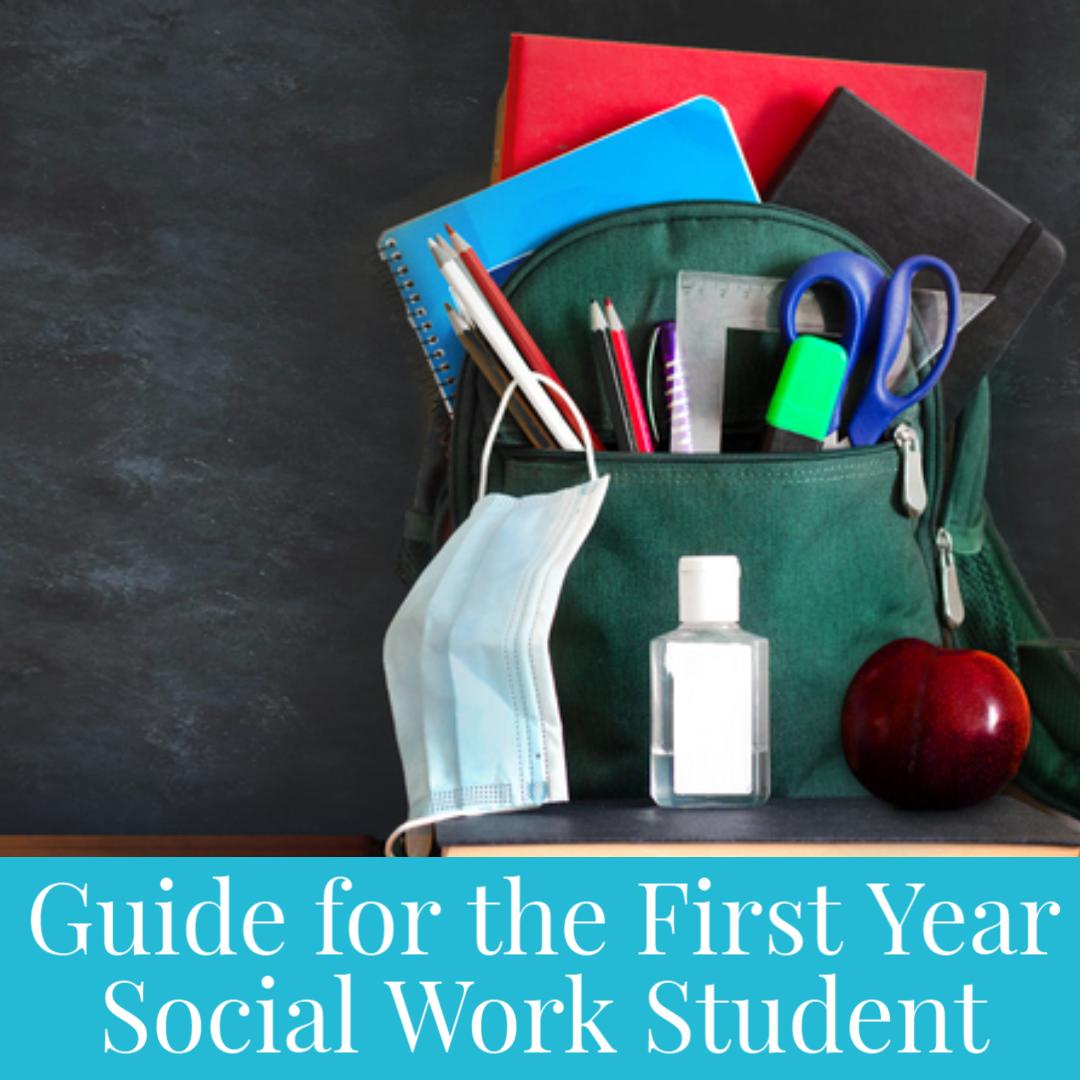
By Emily Glazer

Emily Glazer
Congratulations! If you are reading this that means you are probably starting your first year of school as a social work student or maybe you’re currently in social work school, looking into possible careers and majors. Now that we are getting towards the end of summer and transitioning into fall, that means some are going back to school! If you are a first-year social work student what can you expect?
The first day, week, month, even semester of school can bring a variety of emotions. I hope these tips, tricks, and information on social work can help you to feel more relaxed about beginning your journey.
Planning Your Schedule
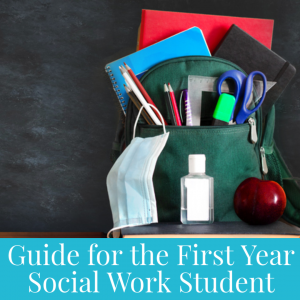
- If classes are on campus, (make sure to read your school’s most updated COVID-19 policy) give yourself a break when you have a full day of classes. You might not think you will need it, but you will.
- Give yourself enough time to walk to different parts of the campus. If you have a social work class on one end of campus, but then you have a prerequisite on the opposite end of campus, make sure you allow yourself the time to get to your next class. When it comes to walking across campus you want to give yourself a cushion—just in case you stay after your previous class, the weather is bad, whatever it is, having time to get to your classes can help a lot.
- Choose electives that interest you! Your elective classes are there for you to explore what your school has to offer outside of your chosen major. Some electives will be specific to your major, but the others you choose are up to you, so take the ones that you think you will enjoy the most. Who knows? You might end up double majoring in it or having it become your minor. That is what happened to me. I ended up becoming interested in sociology after my introduction class, took the electives, and continued on that track for a minor.
- Understand the style of the class in which it is taught. There’s face to face instruction, online, and hybrid. What are all of these? In face to face classes, you’ll meet on a regular basis in the classroom. This is where you will have your lectures, group work, in class assignments, and more. When it comes to online classes, you will never show up to a physical classroom and your professor will present you with Power Points, discussion boards, assignments, and exams all virtually. Hybrid classes are a combination of face to face and online instruction. Your instructor will lay out all the dates you need to be in the classroom and when you are not in the classroom, you will be expected to do class virtually.
Staying Organized
How do you juggle classes, work, and everything that comes in between? Maybe you really want to go to that club meeting at 12:00 but you have a 2:30 class and the paper is due, and you haven’t finished it yet. What do you do and how do you stay organized as a college student?
- Buy a planner! This will be your best friend. Write down all your class times, work schedule, social plans, and whatever else it is that is keeping you busy as soon as you know them. That way you don’t accidentally double book or miss an important deadline. Having a planner to refer back to makes life a lot easier. (Helpful tip, I also liked keeping a daily schedule in the front that had my class days, times, and room numbers. It really helped me at the beginning of each semester!)
- Refer to your syllabi and keep printed copies on hand for each class. Your professors will give you a copy of their syllabus on the first day of class and may make it available online before then. The syllabus not only contains all the class rules, procedures, and guidelines for that specific professor, but it has a calendar for the semester. All your due dates will be listed with instructions to that specific assignment. The dates of your exams and possible days off will also be listed. Make sure to go through your syllabi and mark down any date in your planner and highlight the information that you find important. Keep in mind that some details in your syllabi might change as the semester progresses. Reading your syllabi might feel overwhelming at first, but once you get adjusted and really figure out the style of the class it will all become easier.
- Get your textbooks before the first day of class and stay on top of your readings. Most likely, there will be weekly readings and staying on top of them helps you to come prepared to your classes and have a better understanding of the material.
- Don’t overbook yourself. College is filled with clubs, activities on campus, friends, and of course classes. Just make sure you are not taking on more than you can handle. You don’t have to be in every club and take part in each and every activity. Just try out what interests you.
Getting a Taste of Social Work
You have your planner, your syllabi, your textbooks, and have already made it to your first club meeting, that is great! Now what?
Your first semester of social work classes are going to be very exciting! These are your classes where you are going to get an overview as to what exactly social work is, how it began, and you’ll get an understanding for all the different types of social workers out there. It might feel as if there is a lot of information to absorb, but by taking it one class at a time and reviewing your notes each week, everything will come together.
There is also no pressure to know what type of social worker you want to become. There are many different types of social workers out there and you are just learning. Chances are, what you think you want, may not be what you go into. Before I started school, I thought I wanted to work in child welfare, but now, here I am getting a master’s degree in counseling on the path to becoming a school-based therapist!
Starting college is an exciting time, this is your first step to becoming a social worker. Don’t be afraid to ask questions along the way. Your professors and advisors are all there to help you. Enjoy the ride!
Here’s to a great school year. I hope it is filled with lots of good vibes and positivity!
Reprinted with permission from Social and Relevant: All things relevant to the modern social worker, by a social worker. You can reach Emily Glazer at [email protected] and follower her @social_and_relevant on Instagram.

Focus on Gerontology: Managing the Aging Baby Boomers
May 29, 2024
By Peter Craig The aging baby boomer population is reaching critical mass. In 2020, according to the Census Bureau, that group numbered some 73 million—the second-largest segment of the U.S. population after Millennials—with 55.8 million of boomers, or 16.8% of the...

Human-Animal Connections: Veterinary Social Work Roles Grow as the Specialty Area Evolves
By Raju Chebium Kelly Bremken is a new kind of veterinary social worker. She personifies how much the practice area has evolved since its inception 21 years ago. Back then, the handful of veterinary social workers sprinkled throughout the country pretty much focused...

Complete the Social Work Census by June 30!
May 28, 2024
Findings will help support the development of a more inclusive & equitable social work workforce
University Libraries
- Research Guides
- Blackboard Learn
- Interlibrary Loan
- Study Rooms
- University of Arkansas
SCWK 4333: Social Work Practice I
Assignments.
- Getting Started
- Journal Databases
- Books and Journals
- Government Publications and Reports
- InterLibrary Loan
- Citing Your Sources
- Academic Integrity at UofA
Component #3 Client engagement and bio-psycho-social assessment
- This is the first of a two-part assignment.
- Discussion of client engagement for this individual, including strategies you may use, potential power differences that may exist, and any personal issues that may arise for you in working with such an individual.
- Discussion of this individual, considering the bio-psycho-social assessment framework. This will include areas of client need, client strengths, all dimensions of the bio-psycho-social framework, and additional information you would need about the client’s situation to complete a comprehensive assessment.
- Review of relevant evidence regarding individuals like your character. You will be required to find and discuss two sources that describe characteristics of a population which the client is a member of and two sources that discuss services or interventions for the population.
- Short stories to choose from
- Detailed instructions and requirements
- Grading rubric
- Note: we will also all read one additional short story and use it as an example during class discussions to highlight 1) issues of engagement, assessment and planning in general and 2) the requirements of the assignment.
Component #4 Client planning and evaluation
- This is the second part of the assignment using the short stories.
- An intervention plan including client goals, measurable objectives and specific interventions/actions.
- A discussion of why you would propose such a plan to this individual.
- A discussion of how you would evaluate the intervention(s), identify how termination should occur, and discuss any recommended follow-up plan.
Component #5: Memo and referral
- A professional internal memo regarding a hypothetical client.
- A professional external referral regarding a hypothetical client.
- Note: for these you may continue to use the character from your short story or just make up a client and situation.
- << Previous: Academic Integrity at UofA
- Last Updated: Mar 28, 2024 4:55 PM
- URL: https://uark.libguides.com/c.php?g=563741
- See us on Instagram
- Follow us on Twitter
- Phone: 479-575-4104
Want to create or adapt books like this? Learn more about how Pressbooks supports open publishing practices.
By Micah Beckman, MSW
This chapter was written by Micah Beckman, a social work MSW student, as her final Capstone project. The purpose of this chapter is to provide introductory knowledge regarding the history surrounding the social work profession and orient students to the professional roles and knowledge required to become an effective social worker. Self-Awareness and its importance are discussed and activities are provided to help students explore their individual strengths, weaknesses, beliefs, and motivations. Key characteristics and skills essential to the social work profession are identified and discussed for those students who are wishing to pursue a career within the social work profession.
The History of Social Work in the United States
Video: Legacies of Social Change https://vimeo.com/104132906
The inception of the social work profession in the United States can be traced back to the late 1800’s beginning with charity work performed by local churches and communities seeing to meet the needs of the poor. Some of the earliest social work interventions were designed to meet basic human needs of populations and placed great value in providing support, assistance, and resources to families and communities in an attempt to alleviate suffering (Nsonwu, Casey, Cook & Armendariz, 2013). The profession now known as social work ultimately began as a result of a practice originally known as “helping” others to improve the well being of individuals, families, and communities. Throughout the years the social work profession played vital roles in the facilitation of social changes aimed at diminishing inequalities among various populations. Through the practice of “helping,” social workers were able to address many social problems that plagued vulnerable populations through facilitating, advocating, and influencing individuals, communities, politicians, and law makers (Langer & Leitz, 2014).
Throughout the progressive movement era, many social workers emerged and were identified as key players known to have advanced the profession. These individuals came to be known as pioneers of the social work profession as their careers were devoted to improving the well being of individuals, families, and communities. In an effort to help conceptualize the social work profession, we will look closer at the origin of the social practice, as well as discuss a few pioneers and their contributions to the social work profession (Hansan, 2013).
In the early 20th century, Robert Hunter’s book Poverty was published. Hunter’s book placed a spotlight on America’s poor and challenged society’s long held belief that poverty signified moral failure (Hansan, 2013). Hunter’s book demonstrated a critical need to implement specific social measures in order to prevent the destruction of the working class population on the verge of poverty. Hunter additionally identified conditions known to breed poverty calling into question the need but also the tolerance for these unjust conditions particularly by a professed Christian population (Hunter, 1904).
Another known pioneer of the social work profession is Mary Richmond. Throughout her career, Richmond searched for answers surrounding the reasons and causes of poverty while also examining the interactions between individuals and their environments. Richmond believed that interventions and treatment approaches needed to be focused on the person within their environment. As a result of this belief, Richmond developed the circle diagram as a way to help her clients identify sources of power available to them within their own environment. One of Richmond’s biggest contributions to the social work profession was her book Social Diagnosis which was published in 1917. Richmond’s book focused on the practice of casework with individuals and was the first book to identify a systematic and methodological way to document and diagnose clients ( Social Welfare History Project , 2011).
Jane Addams is another well-known pioneer to the social work profession. Addams, along with Ellen Gates Starr, founded Hull-House in 1889. Hull-House was a successful settlement house located in an area of Chicago that was largely populated by immigrants. Residents of Hull-House were provided with multiple services which included daycare and kindergarten facilities for the children of the residents. Throughout her career Addams’ continued to contribute to the social work profession by advocating for the rights and well-being of women and children on several important issues, one of those issues being the implementation of child labor laws (Hansan, 2010).
Jane Hoey’s career as a social worker began in 1916 when she was appointed as the Assistant Secretary of the Board of Child Welfare in New York City. Throughout the course of her career she would work in multiple social welfare agencies: serving as the Director of Field Service for the Atlanta Division of the American Red Cross, the Secretary of the Bronx Committee of the New York TB and Health Association, the Director of the Welfare Council of New York City, and ultimately as the Director of the Bureau of Public Assistance. Hoey is best known for her role in the enactment of the Social Security Public Assistance Act which became law in 1935. Following the law’s enactment, Hoey became the Director of the Bureau of Public Assistance within the Social Security Administration and was responsible for organizing and implementing the distribution of the public welfare provisions ( Social Welfare History Project , 2011).
Additional Reading Material
Mary Richmond’s Social Diagnosis
https://archive.org/details/socialdiagnosis00richiala
Robert Hunter’s Poverty
https://archive.org/details/povertypoor00huntuoft
Social Work: What is it?
For over a century the answer to this question has been not only varied but also debated among members of the general public as well as in the professional social work community. The definition of “social work” may not be as clear as one may think when attempting to understand the meaning of social work. Embedded within these definitions of “social work” are common themes which can help to conceptualize social work. Although there are many varying definitions used to describe social work, what matters the most is the purpose of social work and what guides and directs social work practice. According to the Council on Social Work Education (CSWE), the purpose of the social work profession is to “promote human and community well-being”; which can be achieved through promoting social and economic justice and preventing conditions that limit human rights for all people.
Even after defining social work and identifying the purpose of the social work profession, there continues to be some misalignment among the profession with the overall mission of social work. This is not surprising considering the increasingly diverse populations being served by the profession. What is becoming increasing clear as the diversity of client systems continues to expand, is the critical importance of professional competence in order to meet the unique needs of individuals as well as emerging social issues. In an effort to better prepare new social workers to respond to these new challenges and social issues, the CSWE adopted a competency-based education framework, Educational Policy and Accreditation Standards, which gives students the opportunity to demonstrate and integrate social work knowledge and skills in various practice settings. More than ever social work requires a broad knowledge base in order to effectively meet the needs of others but also to help clients find hope in the process. Finding hope is essential to the social work practice as hope helps to empower diverse populations facing unique challenges (Clark & Hoffler, 2014).
The feelings associated with a sense of hope are considered to be fundamental to the social work practice. Hope is essential to social work as it allows those facing challenges to believe in a positive outcome and hope can play a major role in how the challenges/circumstances are viewed. A sense of hope is as essential to clients as it is for social workers who are helping clients. Social workers struggling to feel hope may communicate this verbally and non-verbally in their approach with their clients, ultimately impacting the effectiveness of the intervention. This is one of several reasons individuals wishing to pursue a career in social work should explore their personal values, overall worldview, beliefs, abilities, skills, and priorities as well as personal and career goals. This type of exploration is essential to determining whether or not a career in the social work field will be a good fit. In addition, individuals should also consider the demands, stressors, and challenges common to the social work practice giving serious consideration to whether helping the most vulnerable populations will negatively impact their own physical and/or mental health and overall quality of life (Sheafor, Horejsi, & Horejsi, 2000).
Additional Activities:
When in Doubt, Give Hope . (Speech starts at 2:20)
Allison Brunner a newly graduated MSW talks about her anxieties and doubts that recent graduates feel with their professional responsibility to hold hope for their clients. She describes her own doubts as a social worker, relates those to her personal moments of doubt and shares how she drew from those experiences to help her client. Using our experiences to benefit our clients rather than ourselves, is what we call “professional use of self.” And as Carl Rogers demonstrated many years ago, bringing our genuine self to the clinical relationship is one of the most important things we can do to help our clients.
Retrieved from: http://www.socialworkpodcast.com/GraduationSpeech2009.mp3
Bachelors of Social Work (BSW) versus Masters of Social Work (MSW)
According to the Bureau of Labor Statistics, the minimum pre-requisite needed to gain employment in the social work profession is a Bachelor’s Degree in Social Work (BSW). However, those with specific career goals may be required to obtain a higher level of education. Therefore, some may wish to pursue a Master’s Degree in Social Work (MSW).
Social workers may serve in all of these different roles in varying degrees at any time in their career.
There are some similarities between the two degrees which include the expectation that both BSW and MSW students complete supervised field placements within a social service type agency. The requirements related to the length of placement, expected tasks, and/or hours may vary based on degree. Common social service agency placements for both BSW and MSW students include places such as hospitals, schools, or mental health or substance abuse clinics. In addition to this requirement, both BSW and MSW graduates must be granted a license in the state they wish to practice. Licensure for an MSW requires a minimum of 2 years of supervised clinical experience following graduation and a passing score on the Association of Social Work Boards (ASWB) licensing examination.
There are several key differences between BSW and MSW degrees. One of the first differences is the pre-requisite for entrance into the programs. Typically the only requirement needed to enter into an accredited BSW program at a college or university is that the candidate has declared social work as their major. This differs from an MSW program as MSW candidates apply for entrance into the program after already having obtained a Bachelor’s Degree in which the graduate has likely earned credits in coursework areas related to psychology and sociology.
Another difference is the coursework required based on the desired degree. The Council on Social Work Education (CSWE), which accredits U.S. social work programs, designates BSW undergraduate programs teach students about diverse populations, human behavior, social welfare policy, and ethics in social work. Additionally, students are required to complete a supervised field placement at a social service agency. Baccalaureate social workers have the ability to obtain specialty certification in certain areas through their state chapter of the National Association of Social Workers (NASW), which offers specialty certification available in child, youth and family social work, gerontology, casework, and hospice, and palliative care. Master’s degree programs focus on developing clinical assessment and management skills and prepare students for work in a more targeted areas depending on the student’s interest.
The other important differences between the two degrees involves the type of employment each degree holder is eligible for and the earning potential based on the degree. MSW graduates typically earn a significantly higher salaries than BSW graduates. Individuals with a BSW degree tend to be employed in entry level jobs as caseworkers and are expected to provide direct services to clients through assessing, coordinating, and referring to area resources. The Michigan Board of Social Workers outlines the scope of practice/expected duties for social workers based on education and designated practice area (see chart below).
MSW graduates are often employed in clinical settings such as a hospital or a private practice setting and also in various administrative positions. MSW graduates can obtain either a Macro or Clinical license. The scope of practice differs depending on the type of MSW license. According to the National Association of Social Workers (NASW), a licensed Master Social Worker with macro designation can expect to be involved in administration, management, and supervision of human service organizations and perform functions that seek to improve the overall population’s quality of life through a policy/administrative perspective. These tasks range from collaboration, coordination, mediation, and consultation within organizations and/or communities, community organizing and development, research and evaluation, and advocacy/social justice work through involvement in the legislative process. A licensed Master Social Worker with a clinical designation (micro) typically work directly with individuals, families, and/or groups in an effort to improve the client’s overall quality of life. Social workers can expect to perform the following tasks/functions: advocating for care, protecting the vulnerable, providing psychotherapy as defined as “assessment, diagnosis, or treatment of mental, emotional, or behavioral disorders, conditions, addictions, or other biopsychosocial problems.”

For a pdf of this chart, please see: http://www.michigan.gov/documents/mdch/mdch_sw_swgridforscopeofpractice_216194_7.pdf
What is a client? What’s in a name?
It is important that the social work profession accurately define and describe the relationship that exists between those who receive services and those who provide services (social workers). Over the years many terms have been used to describe the service-recipient relationship. Many of these terms have been scrutinized as failing to accurately describe the relationship that exists between the social worker and the service recipient. McLaughlin (2008) identified four terms commonly used to describe the social worker-service user relationship as patients, consumers, and service users. It is important to explore the language used to conceptualize this relationship because the social work profession seeks to empower the most disadvantaged and vulnerable of the population the language we use matters.
Client is the most widely used term used to describe the social work relationship.
The meaning and implications of the term “client” have been questioned as it gives the impression that the social worker is in a position of power over the client. In this instance a client would be viewed as someone who needs help but does not have the ability to help themselves, due to some deficiency either a lack of skills or ability, and therefore requires the knowledge of a social worker (McLaughlin, 2008).
The term “consumer” has been used to describe the relationship of those who use services the state offers. The meaning and implications of using the term “consumer” suggests that those receiving services has options and choices and the social worker is acting as a manager or a monitor of services and/or resources (McLaughlin, 2008).
The term “service user” has also been used in various social work settings. However “service user” may not be appropriate for use in all types of social work practice. For example social workers working in the arena of children’s protective services are mandated to respond to child abuse and neglect based on agency and state law. In this situation the service user would most likely object to the social worker’s response, therefore the service user would not be officially involved in the decision making process. Over the years social workers have been given a major role in the assessment of needs and risks over client groups and this role is often associated with a policing or surveillance role. In this way the relationship that exists between the client and social worker may get confusing and ambiguous (McLaughlin, 2008).
Common Roles of Social Workers
Over the course of their career, a social worker at any one time may perform multiple roles to varying degrees. The difficulty for many social workers is that over time the roles that involve direct case work have lessened; often social workers will find themselves in a position that involves little client involvement. One of the most difficult situations social workers will experience in their careers is the conflict they face while fulfilling some of the following roles often expected of a social worker at one time.
A social worker acting as a broker assists and links people with services or resources. In this role social workers assess the needs of the individual while also taking into account the client’s overall capacity and motivation to use available resources. Once the needs are assessed and potential services identified, the broker assists the client in choosing the most appropriate service option. The social worker as a broker role is also concerned with the quality, quantity, and accessibility of services. This role is expected to be up-to-date on current services and programs available, as well as familiar with the process for accessing those resources and programs (Zastrow, 2016).
Case Manager
A social worker acting as a case manager identifies the needs as well as the barriers of their clients. Occasionally case managers may also provide direct service to their clients. Case managers often engage with clients who require multiple services from a variety of agencies and work with the client to develop goals and implement interventions based on the identified goals. Social workers acting as case managers remain actively engaged with clients throughout the process by identifying and coordinating services, monitoring identified services and providing support when necessary, and finally providing follow-ups to ensure services are being utilized (Zastrow, 2016).
A social worker as an advocate seeks to protect client’s rights and ensure access and utilization of services they are entitled to receive. Social workers may perform advocacy work by advocating for a single client or by representing groups of clients with a common problem or identified need. Social workers may advocate with other organizations/providers and encourage their clients to advocate for themselves in order to address a need or obtain a service. Advocacy is an integral and fundamental role in the social work profession as it is necessary to promote overall wellbeing. The National Association of Social Workers (NASW) (2015) “has specified social workers’ responsibility to the community and broader society since its adoption in 1960, and in 1996, strengthened its call to require all social workers to “engage in social and political action” to “expand choice and opportunity” and “equity and social justice for all people” (p. 27). Social workers acting in this capacity may advocate in varying capacities but often times may find themselves in a position of educating the public in order to garner support to seek changes in laws that are harming and impacting the wellbeing of clients. Social workers acting as advocates should always consider whether they are acting and advocating in a way that maximizes client self-determination (Zastrow, 2016).
Social workers acting as a teacher or educator often help in times of crisis for many clients. In this role social workers help clients develop insight into their behaviors through providing education aimed at helping clients learn skills to handle difficult situations and identify alternative life choices. In this role social workers aim to increase their client’s knowledge of various skills some of which include: budgeting, parenting, effective communication, and/or violence prevention (Zastrow, 2016).
A social worker acting as a counselor helps clients express their needs, clarify their problems, explore resolution strategies, and applies intervention strategies to develop and expand the capacities of clients to deal with their problems more effectively. A key function of this role is to empower people by affirming their personal strengths and their capacities to deal with their problems more effectively (Zastrow, 2016).
Risk Assessor
Social workers acting as risk assessors have been given a major role in the assessment of needs and risks over a variety of client groups. Assessment is a primary role for social workers and often times is what dictates the services and resources identified as needs for clients. Often time’s social workers acting in this role find themselves in precarious situations as the relationship between the client and social worker may be conflicting, especially when working in the mental health field. While working as a risk assessor in the mental health field the social worker may experience conflict between encouraging client self-determination and addressing safety risks.
It is common that social workers act as mediators and negotiators as conflict is the root of many areas of social work. Social workers acting in these roles are required to take a neutral stance in order to find compromises between divided parties. In this role social workers seek to empower the parties to arrive and their own solutions in order to reconcile differences and reach a mutually satisfying agreement (Stoesen, 2006).
R esearcher
A social worker in the role of researcher or program evaluator uses their practice experience to inform future research. The social worker is aware of current research and able to integrate their knowledge with the current research. Social workers acting in this capacity are able to utilize the knowledge they have obtained through gathering and examining the research to inform their practice interventions (Grinnell & Unrau, 2010).
Group Leader
Social workers who play the role of group leader or facilitator can do so with groups of people gathering for purposes including; task groups, psychoeducational groups, counseling groups, and psychotherapy groups. Task groups are like the name infers task oriented and social workers facilitate that process by understanding group dynamics. Psychoeducational groups are led by social workers who focus on developing members’ cognitive, affective, and behavioral skills in an area group members are deficient through integrating and providing factual information to participants. Social workers who facilitate counseling groups help participants resolve problems in various areas that can include: personal, social, educational, or career concerns. In psychotherapy groups social worker address psychological and interpersonal problems that are negatively impacting member’s lives (Corey, Corey, & Corey, 2014).
Additional Suggested Readings
Kerson, T. S., & McCoyd, J. (2013). In response to need: An analysis of social work roles over time. Social work, 58 (4), 333-343. doi: 10.1093/sw/swt035
Gibelman, Margaret (1999). The search for identity: defining social work – past, present, future. Social Work , 44 (4), 298-310. doi: 10.1093/sw/44.4.298
Characteristics and Skills of Effective Social Workers
Much like the definition of the term “social work,” the characteristics and skills required to become an effective social worker are also hard to define and require versatility in this complex and constantly changing environment. Competent and effective social workers are expected to have knowledge in varying intervention strategies and skills in order to enhance functioning and empower others. Effective social workers also must be willing to consider the needs of those being served when designing interventions seeking to enhance the wellbeing of others. In doing so many social workers may adopt specific roles or a combination of roles in order to effectively and efficiently meet the identified need(s). Some common elements and skills have been identified as effective across micro and macro practice settings. It is important to remember that when we are discussing effective social workers it is not just about what they do, it is also about how they do it (Sheafor, Horejsi & Horejsi, 2000).
Self-Awareness
One of the most important skills necessary for becoming a competent and effective social worker is self-awareness. Self-awareness starts with getting to know yourself and requires clarifying one’s own values and assumptions. Every day we are learning and changing as a result of our experiences, therefore self-awareness is a lifelong process that cannot be acquired through education and readings alone. This process requires understanding of past experiences and reflecting on the impacts of those experiences in relation to your world view and view of yourself. People who practice self-awareness can recognize, understand, and regulate their emotions. Self-awareness allows individuals to maximize their strengths by acknowledging their weaknesses. By recognizing areas of both strength and weakness, self-aware people can take proactive steps to manage their weakness and avoid setbacks (Sheafor, Horejsi & Horejsi, 2000).
Competence is essential in the social work world as there are numerous treatment approaches and intervention strategies available for clients. That being said, it is impossible for a social worker to be competent in every intervention strategy or treatment option. Social workers are expected to be knowledgeable in areas and intervention strategies they will be utilizing with their clients. According to Sheafor, Horejsi, and Horejsi (2000), generalist practice social workers need to be prepared to treat a diverse population of clients, which requires knowledge in a variety of assessment and intervention techniques.
Effective social workers can identify personal values, political beliefs and assumptions but also are willing to develop knowledge of other cultures through formal education and interaction. Professional development allows social workers to develop skills that will enable them to implement successful interventions. Cultural competence is also an area that should be considered when determining effectiveness. All social workers should continually seek cultural knowledge; through education and direct interaction. Culture is an area that is constantly changing and social workers should be prepared to engage in life-long learning in order to seek competence.
One of the most critical elements is the relationship between the social worker and the client. Specifically whether or not the client feels the social worker is genuine, supportive and empathetic towards them. A sense of empathy from the social worker increases the chances of building a therapeutic relationship with the client. Because of this, ability to empathize is essential for social workers. Dr. Brown (2013) suggests that empathy is the best way to ease someone’s pain and suffering and is the skill that fuels connections. Empathy is a choice that requires individuals to acknowledge their own vulnerabilities which is often why the ability to empathize is considered a difficult skill to develop.
Critical thinking
The ability to critically think is crucial to the social work profession. Social workers use critical thinking skills on a daily basis to problem solve issues. Critical thinking skills include the ability to ask thoughtful and appropriate questions aimed at empowering others to find their own solutions. It is by applying critical thinking skills that social workers are able to make accurate observations, evaluate client abilities/limitation and/or agencies abilities/limitations. Critical thinking skills can also help social workers generate possible solutions and identify appropriate interventions to implement based of their critical evaluation of the issues and known barriers. Critical thinking skills also aid in the social worker’s ability to examine and evaluate the effectiveness of the interventions (Sheafor, Horejsi & Horejsi, 2000).
Communication skills
Communication in the social work profession encompasses a wide-range of activities beyond the ability to communicate effectively with their clients and other professionals. Determining the best approach to utilize when communicating with clients and other professionals will require the use of critical thinking skills. Many social workers are often working in the role of helping others who are seeking to make changes. Therefore, effective social workers will use a combination of different strategies to help move clients towards change. Social workers with effective communication skills avoid directly telling other’s what to do and rely heavily of their ability to communicate in order to empower clients to identify their own solutions. Developing and utilizing effective communication skills help clients establish trust and promotes rapport building between the social worker and the client which increases the chances of a successful intervention.
It is important to understand that effective communication skills go beyond one’s ability to communicate verbally and includes the ability to communicate through written reports as well as non-verbally while displaying active listening skills. Effective non-verbal communication requires the social worker to portray and display an empathetic, non-judgmental attitude when listening and engaging with clients. Effective written communication skills include the ability to communicate concisely, professionally, and honestly in various written formats as there are multiple mediums in which a social worker must be able to communicate. Because of this, competency in using word processors, email systems, spreadsheets, databases and knowledge of grammar and spelling are an important communication skill. These tasks may seem simple and appear obvious, however may prove challenging. Over time communication skills can be learned with practice, regular reflection, and self-assessment (Sheafor, Horejsi & Horejsi, 2000).
Additional readings
D’Aprix, A. S., Dunlap, K. M., Abel, E., & Edwards, R. L. (2004). Goodness of fit: Career goals of MSW students and the aims of the social work profession in the United States. Social Work Education , 23 (3), 265-280. http://dx.doi.org/10.1080/0261547042000224029
S upplemental Activities
Brené Brown’s TED Talk: The Power of Vulnerability
https://www.ted.com/talks/brene_brown_on_vulnerability
Brené Brown on Empathy (2:53)
https://youtu.be/1Evwgu369Jw
Challenges Ahead
Rothman and Mizrahi (2014) identified a need to rectify an imbalance that exists between micro and macro social work practice to not only strengthen the profession, but to overcome the multitude of problems facing society. Historically the social work profession has addressed the needs of the population with a dual approach, encompasses both macro and micro practice social workers to achieve social progress. This approach requires involvement from social workers at every level of practice to bring about social reform as well as meet the needs of individuals and families.
Currently, the American Academy of Social Work and Social Welfare (AASWSW) is pioneering an innovative approach to achieving social progress powered by science called “The Grand Challenges of Social Work.” The AASWSW identifies 12 challenges and major social problems impacting today’s society. Today’s social workers will need to address and implement effective approaches known to improve individual and family wellbeing in order to begin strengthening the social fabric of America.
The 12 challenges are as follows:
The challenge to ensure healthy development for all youth: The AASWSW has identified the need to prevent behavioral health problems emerging in over six million young people yearly. Evidence has identified several effective prevention based approaches to address the severe mental, emotional, and behavior problems affecting today’s youth.
The challenge to close the health gap : More than 60 million Americans have inadequate access to basic health care. Even more disturbing – the majority of people with inadequate access also experience discrimination and poverty. There is an extreme need to develop new strategies targeted at improving the health of our society.
The challenge to stop family violence : Assaults by parents, partners, and adult children are common American tragedies that often result in serious injury, including death. This type of violence impacts society through various arenas. Effective intervention strategies have been identified and if implemented could help break the cycle of violence for many families.
The challenge to advance long and productive lives: Through identifying and engaging individuals with healthy and productive activities, overall health and well-being can be improved.
The challenge to eradicate social isolation : Social workers can help with this challenge by educating the public about the impacts of social isolation as well as, promote effective ways to make social connections.
The challenge to end homelessness: Over 1.5 million American’s experience homelessness at least one night a year. Homelessness affects health and well-being and often has lasting impacts on personal development. The challenge will be to implement and expand on proven approaches as well as, implement policies that promote affordable housing.
The challenge to create social responses to a changing environment: Climate change and urban development exacerbate the already existing social and environmental inequalities of marginalized communities. The challenge will be to develop improved social responses based on this knowledge as well as, helping those impacted by the changing environment through developing policies specific to helping those in need.
The challenge to harness techn ology for social good: A unique opportunity to access and target various populations and social problems exists because of advances to technology. The challenge will be for social workers to find ways to use technology to not only access knowledge, but to gain expertise for the advancement of the social work profession.
The challenge to promote “smart decarceration ”: With the United States having the world’s largest percentage of its population behind bars this could prove to truly be a grand challenge. “Smart Decarceration” calls for a reduction in the number of people imprisoned, as well as the willingness of a nation to embrace a new and proactive way of addressing safety.
The challenge to reduce extreme inequality: One out of every five children live in poverty, while the top 1% owns almost half of the wealth in the U.S. Poor health outcomes and decreased overall well-being have been documented results of living in poverty. Inequality can be reduced through increased access to education, wages, tax benefits, and/or home ownership. Social workers should seek to adopt policies that promote equality.
The challenge to build financial capability for all: Nearly half of all American households are financially insecure, which means they do not have adequate savings to meet their basic living expense for three months. By adopting policies that support security in retirement accounts as well as, access to financial services that provide for financial literacy there can be a significant reduction in the economic hardships faced by families.
The challenge to achieve equal opportunity and justice: Historic and current prejudice and injustice in the United States impacts several groups of people by impeding and excluding access to education and employment. In order to overcome this challenge social workers must embrace and appreciate diversity and begin shedding light onto unfair practices.
Additional Reading/ Activities
Bent-Goodley, T.B. (2017). Readying the profession for changing times. Social Work, 62 (2), 101-103. doi : 10.1093/ sw /swx014
Singer, J. B. (Producer). (2016, March 28). #103 – The Grand Challenges for Social Work: Interview with Dr. Richard P. Barth [Audio Podcast]. Social Work Podcast . Retrieved from http://www.socialworkpodcast.com/2016/03/grand-ch a llenges.html
Activities for Chapter One
Activity #1
25 questions to help you get to know yourself
http://www.mistysansom.com/know-who-you-are-with-these-25-questions
- What does your ideal day look like?
- What did you want to be when you were younger?
- Who are you most inspired by? Why?
- Who would you love to meet? What would you ask?
- What habit would you most like to break? What habit would you most like to start?
- Think of a person you truly admire. What qualities do you like about that person?
- How do you like to relax?
- When was the last time you did something you were afraid of?
- What are you most proud of?
- What are you most afraid of?
- If life stopped today, what would you regret not doing?
- Who would you like to connect (or reconnect) with? Why?
- What qualities do you admire in others?
- What practical skills do you wish you had?
- Imagine you’re in your 90s. What memories would you like to have? What stories do you want to tell?
- What is your favorite book/movie/song? Why?
- If you could make one change in the world, what would it be?
- What do you love to do for, or give to others (not an object – something from you personally)?
- What excites you?
- What do you wish you did more of?
- Pretend money is no object. What would you do?
- What area of your life, right now, makes you feel the best? Which area makes you feel the worst? Why?
- Let’s jump forward a year. What would you like to have achieved in the past year?
- What piece of advice would you give to five year old you? Sixteen year old you? Twenty-one year old you? Right now?
- How do you want to be remembered in life?
Activity #2:
The Five Minute Personality Test
http://www.sagestrategies.biz/documents/FiveMinutePersonalityTestforclass.pdf
Activity #3:
Character Strengths Survey
https://www.viacharacter.org/www/Cha r acter-Strengths-Survey
Singer, J. B. (Producer). (2014, July 8). #87 – Beginnings, middles, and ends: Stories about social work from Ogden Rogers, Ph.D. [Audio Podcast]. Social Work Podcast. Retrieved from http://socialworkpodcast.blogspot.com/2014/07/ogden.html
Brunner, Allison (2009). When In doubt, give hope.” Social Work Podcast. Retrieved from http://www.socialworkpodcast.com/GraduationSpeech2009.mp3
Singer, J. B. (Producer). (2016, March 28). #103 – The Grand Challenges for Social Work: Interview with Dr. Richard P. Barth [Audio Podcast]. Social Work Podcast . Retrieved from http://www.socialworkpodcast.com/2016/03/grand-challenges.html
American Academy of Social Work and Social Welfare. (2017). Grand challenges for social work. Retrieved from http://aaswsw.org/grand-challenges-initiative./
Asquith, S., Clark, C. L., & Waterhouse, L. (2005). The role of the social worker in the 21st century: A literature review . Edinburgh: Scottish Executive Education Department. Retrieved from http://www.gov.scot/Publications/2005/12/1994633/46334
Bent-Goodley, T.B. (2017). Readying the profession for changing times. Social Work, 62 (2), 101-103. doi: 10.1093/sw/swx014
Blundo, R. (2001). Learning strengths-based practice: Challenging our personal and professional frames. Families in Society: The Journal of Contemporary Social Services, 82 (3), 296-304. doi:10.1606/1044-3894.192
Brown, B. (December. 2013). Brené Brown on empathy . Retrieved from https://www.youtube.com/watch?v=1Evwgu369Jw&feature=youtu.be
Brunner, A. (2009) When in doubt, give hope [Audio file]. Social Work Podcast. Retrieved from http://www.socialworkpodcast.com/GraduationSpeech2009.mp3
Clark, E. J. (2017). 10 essentials social workers must know about hope [Blog post]. Retrieved from http://www.socialworker.com/feature-articles/practice/10-essentials-social-workers-must-know-about-hope/
Clark, E. J., & Hoffler, E. F. (2014). Hope matters: The power of social work. Washington, DC: NASW Press.
Corey, M., Corey, G., & Corey, C. (2014). Groups: Process and Practice (9th ed.) Pacific Grove, CA: Brooks/Cengage Learning.
Council on Social Work Education (CSWE), Commission on Accreditation. (2016, July). Handbook of social work accreditation policies and procedures. Retrieved from https://cswe.org/Accreditation/Standards-and-Policies/EPAS-Handbook
Gibelman, Margaret. (1999). The search for identity: defining social work – past, present, future. Social Work , 44 (4) p298-310. doi: 10.1093/sw/44.4.298
Grinnell, R.M., & Unrau, Y.A. (2010). Social work research and evaluation: Foundations of evidence-based practice [9th ed.]. New York: Oxford University Press.
Hansan, J. E. (n.d.). Ida Minerva Tarbell (1857-1944): Journalist, muckraker. In Social Welfare History Project. Retrieved from http://socialwelfare.library.vcu.edu/people/tarbell-ida-minerva/
Hansan, J.E. (2010, December 14). Jane Addams (1860-1935): Founder of Hull House, social reformer, women’s advocate and winner of Nobel Peace Prize. In Social Welfare History Project. Retrieved from http://socialwelfare.library.vcu.edu/settlement-houses/addams-jane/
Hansan, J.E. (2013). Hunter, (Wiles) Robert (April 10, 1874 – May 15, 1942), social worker, author and socialist. In Social Welfare History Project . Retrieved from http://socialwelfare.library.vcu.edu/people/hunter-robert/
Hunter, R. (1904). Poverty. New York: The Macmillan Company. Retrieved from https://archive.org/details/povertypoor00huntuoft
Jane M. Hoey (1892-1968): Social worker, welfare administrator, government official. (2011). In Social Welfare History Project . Retrieved from http://socialwelfare.library.vcu.edu/people/hoey-jane-m/
Kerson, T. S., & McCoyd, J. (2013). In response to need: An analysis of social work roles over time. Social Work. 58(4) 333-343. doi: 10.1093/sw/swt035
Langer, C. L., & Lietz, C. (2014). Applying theory to generalist social work practice. Hoboken, NJ: Wiley.
Mary Ellen Richmond (1861-1928): Social work pioneer, administrator, researcher and author. (2011). In Social Welfare History Project . Retrieved from http://socialwelfare.library.vcu.edu/social-work/richmond-mary/
McLaughlin, H. (2008). What’s in a name: ‘Client’, ‘patient’, ‘customer’, ‘consumer’, ‘expert by experience’, ‘service user’—What’s next? British Journal of Social Work , 39 (6), 1101-1117. https://doi.org/10.1093/bjsw/bcm155
National Association of Social Workers (NASW). (2015). Code of Ethics of the National Association of Social Workers . Washington, DC: NASW Press. Retrieved from https://www.socialworkers.org/pubs/code/default.asp
Nsonwu, M. B., Casey, K., Cook, S. W., & Armendariz, N. B. (2013). Embodying social work as a profession: A pedagogy for practice. SAGE Open , 3 (3), 1-8. https://doi.org/10.1177/2158244013503835
Richmond, M. E. (1917). Social diagnosis. New York: Russell Sage Foundation
Rothman, J., & Mizrahi, T. (2014). Balancing micro and macro practice: A challenge for social work. Social Work , 59 (1), 91-93.
Sheafor, B. W., Horejsi, C. R., & Horejsi, G. A. (2000). Techniques and guidelines for social work practice (5th ed.). Boston: Allyn and Bacon
Singer, J. B. (Producer). (2014). #87 – Beginnings, middles, and ends: Stories about social work from Ogden Rogers, Ph.D. [Audio podcast]. Social Work Podcast. Retrieved from http://socialworkpodcast.blogspot.com/2014/07/ogden.html
Singer, J. B. (Producer). (2016). #103 – The Grand Challenges for Social Work: Interview with Dr. Richard P. Barth [Audio podcast]. Social Work Podcast . Retrieved from http://socialworkpodcast.blogspot.com/2016/03/grand-challenges.html
Social Work Degree Guide. (2017). Five differences between BSW and MSW programs. Retrieved from http://www.socialworkdegreeguide.com/lists/five-differences-between-bsw-and-msw-programs/
Stoesen, L. (2006). Mediation a natural for social workers. NASW News, (51)8. Retrieved from http://www.naswdc.org/pubs/news/2006/09/mediation.asp
Uehara, E.S., Barth, R. P., Olson, S., Catalano, R. F., Hawkins, J. D., … Sherraden, M. (2015). Identifying and tacking grand challenges for social work. (Grand Challenges for Social Work Initiative, Working Paper No. 3). Retrieved http://aaswsw.org/wp-content/uploads/2015/12/WP3-with-cover.pdf
Zastrow, C. (2016). Generalist social work practice: A Worktext (11th ed). Chicago: Lyceum Books, Inc.
Introduction to Social Work at Ferris State University Copyright © 2017 by andes109 and Department of Social Work is licensed under a Creative Commons Attribution 4.0 International License , except where otherwise noted.
Share This Book
Social Work Toolbox: 37 Questions, Assessments, & Resources

This may be because of its unlikely position, balanced between “the individual and society, the powerful and the excluded” (Davies, 2013, p. 3).
Social work is a unique profession because of its breadth and depth of engagement and the many governmental and private organizations with which it engages.
Not only does it help individuals and groups solve problems in psychosocial functioning, but it also attempts to support them in their life-enhancing goals and ultimately create a just society (Suppes & Wells, 2017).
This article provides a toolbox for social workers, with a selection of assessments and resources to support them in their role and career.
Before you continue, we thought you might like to download our three Positive Psychology Exercises for free . These science-based exercises will explore fundamental aspects of positive psychology including strengths, values, and self-compassion, and will give you the tools to enhance the wellbeing of your clients, students, or employees.
This Article Contains:
6 best resources for social workers, top 17 questions to ask your clients, 2 assessments for your sessions, social work & domestic violence: 5 helpful resources, our 3 favorite podcasts on the topic, resources from positivepsychology.com, a take-home message.
Demanding professions require dedicated and supportive resources that transform social work theory into practice. The following worksheets and tools target some of the most challenging and essential areas of social work (Rogers, Whitaker, Edmondson, & Peach, 2020; Davies, 2013):
Emotional intelligence
“Understanding emotion arises from the combined consciousness of how we perceive emotions and use our intellect to make sense of them” (Rogers et al., 2020, p. 47).
For social workers, emotional intelligence is invaluable. They must develop and maintain awareness of both their own and their client’s feelings and use the insights to select appropriate interventions and communication strategies without becoming overwhelmed.
The Reflecting on Emotions in Social Work worksheet encourages social workers to stop and consider their feelings following an initial client visit.
In the worksheet, the social worker is guided to find some quiet time and space to reflect on:
- How do I feel about my initial visit?
- What are my thoughts regarding the purpose of the visit?
- How do I think I can proceed with developing a relationship with the client?
- How do I think the client feels about my visit?
Being self-aware is a crucial aspect of social work and will inform the ongoing relationship with the client.
Fostering empathy
Mirror neurons fire when we watch others performing an action or experiencing an emotion. They play a significant role in learning new skills and developing empathy for others’ experiences (Thomson, 2010).
Social workers must become more aware of service users’ experiences, as they can influence and affect the interaction with them.
Use the Fostering Empathy Reflectively worksheet to improve the understanding of your own and others’ emotions and increase the degree of empathy.
Observing others can make social workers more aware of human behavior and the emotions and thoughts underneath to increase their capacity for empathy.
Reflective cycle
Reflecting on situations encountered on the job can help social workers fully consider their own and their clients’ thoughts and feelings before drawing conclusions. Indeed, “successful reflection emphasizes the centrality of self-awareness and the capacity for analysis” (Rogers et al., 2020, p. 64).
Use the Reflective Cycle for Social Work to reflect on events, incidents, and behaviors in a structured and systematic way (modified from Gibbs, 1988).
Challenging social interactions
Good communication skills and confidence in social interactions are essential for social work. There will be times when you need assertiveness to challenge others to ensure the client’s needs are met (Rogers et al., 2020).
However, like all skills, social skills can be learned and maintained through education and practice.
The Preparing for Difficult Social Interactions worksheet considers how a situation or event may unfold through focusing on the essential issues.
Practice and role-play can help social workers prepare for a more successful social interaction and gain confidence in their coping abilities.
Motivational Interviewing in Social Work
“Change can become difficult for service users when they are ambivalent about the extent to which the change will be beneficial” (Davies, 2013, p. 451).
One method used by social workers to explore their clients’ intrinsic values and ambivalence is through motivational interviewing (MI). MI has four basic principles (modified from Davies, 2013):
- Expressing empathy Displaying a clear and genuine interest in the client’s needs, feelings, and perspective.
- Developing discrepancy Watching and listening for discrepancies between a client’s present behavior and values and future goals.
- Rolling with resistance Avoiding getting into arguments or pushing for change.
- Supporting self-efficacy Believing in the client’s capacity to change.
The Motivational Interviewing in Social Work worksheet uses the five stages of change to consider the client’s readiness for change and as input for selecting an appropriate intervention (Prochaska & DiClemente, 1986; Davies, 2013).
The client should be encouraged to create and implement a plan, including goals and details of the specific tasks required.
Respectful practices
Rogers et al. (2020) identified several fundamental values that social workers should be aware of and practice with their service users, families, and other organizations with which they engage. These include:
- Individuality
- Honesty and integrity
The Respectful Practices in Social Work worksheet encourages reflection on whether a social worker remains in touch with their values and the principles expected in their work.
Social workers should frequently think of recent examples of interactions with clients, families, and other organizations, and ask themselves (modified from Rogers et al., 2020):
- Were you polite, courteous, warm, and approachable?
- How well did you accept people with different beliefs and values from your own?
- Did you attempt to understand the person and their history?
- Were you professional, open, honest, and trustworthy?
- Did you treat each person equally, providing fair access to your time and resources?
A regular check-in to ensure high standards are being maintained and values remain clear will ensure the continued professionalism expected from a social worker.

The following questions provide practical examples; practitioners should tailor them according to timing and context and remain sensitive to the needs of all involved (Rogers et al., 2020; Suppes & Wells, 2017; Davies, 2013).
Open questions
Open questions encourage the respondent to reflect and respond with their feelings, thoughts, and personal experiences. For example:
- What is your view of what happened?
- What has it been like living with this issue?
- How could we work together to find a good solution?
- What are your greatest fears?
Closed questions
Typically, closed questions are used to find out personal details such as name and address, but they can also provide focus and clarity to confirm information. Closed questions are especially important when dealing with someone with cognitive impairment or who finds it difficult to speak up, and can lead to follow-up, open questions.
For example:
- How old are you?
- Are you in trouble?
- Are you scared?
- Do you need help?
Hypothetical questions
Hypothetical questions can be helpful when we need the service user to consider a potentially different future, one in which their problems have been resolved. Such questions can build hope and set goals. For example:
- Can you imagine how things would be if you did not live with the fear of violence?
- Where would you like to be in a few years after you leave school?
- Can you imagine what you would do if a similar situation were to happen again?
Strengths-based questions
“Focusing on strengths helps to move away from a preoccupation with risk and risk management” and builds strengths for a better future (Rogers et al., 2020, p. 243). Strengths-based questions in social work can be powerful tools for identifying the positives and adopting a solution-focused approach.
Examples include:
- Survival – How did you cope in the past?
- Support – Who helps you and gives you support and guidance?
- Esteem – How do you feel when you receive compliments?
- Perspective – What are your thoughts about the situation, issue, or problem?
- Change – What would you like to change, and how can I help?
- Meaning – What gives your life meaning?

Download 3 Free Positive Psychology Exercises (PDF)
Enhance wellbeing with these free, science-based exercises that draw on the latest insights from positive psychology.
Download 3 Free Positive Psychology Tools Pack (PDF)
By filling out your name and email address below.
Interventions in social work are often described as having four stages: engagement, assessment, intervention, and evaluation (Suppes & Wells, 2017).
The assessment stage typically involves:
- Collecting, organizing, and interpreting data
- Assessing a client’s strengths and limitations
- Developing and agreeing on goals and objectives for interventions
- Selecting strategies appropriate to the intervention
Assessment is an ongoing process that typically focuses on risk. It begins with the referral and only ends when the intervention is complete or the case closed.
Assessment will need to be specific to the situation and the individuals involved, but it is likely to consider the following kinds of risks (Rogers et al., 2020; Bath and North East Somerset Council, 2017):
General risk assessment
Risk management does not remove risk, but rather reduces the likelihood or impact of problematic behavior. Risk assessments are performed to identify factors that may cause risky behavior or events (Davies, 2013).
Questions include:
- What has been happening?
- What is happening right now?
- What could happen?
- How likely is it that it will happen?
- How serious could it be?
The wording and detail of each will depend on the situation, client, and environment, guided by the social worker’s training and experience.
Assessment of risk to children
A child’s safety is of the utmost importance. As part of the assessment process, a complete understanding of actual or potential harm is vital, including (modified from Bath and North East Somerset Council, 2017):
- Has the child been harmed? Are they likely to be harmed?
- Is the child at immediate risk of harm and is their safety threatened?
- If harmed previously, to what extent or degree? Is there likely to be harm in the future?
- Has there been a detrimental impact on the child’s wellbeing? Is there likely to be in the future?
- Is there a parent or guardian able and motivated to protect the child from harm?
Social workers must use professional judgment to assess the level of risk and assure the child’s ongoing safety.

Assessment process – Oregon Department of Human Services

The figures related to domestic violence are shocking. There are 1.3 million women and 835,000 men in the United States alone who are physically assaulted by a close partner each year (NASW, n.d.).
The NASW offers valuable resources to help social workers recognize the signs of existing domestic violence, prevent future violence, and help victims, including:
- We can help end domestic violence – information on how the White Ribbon Day Campaign is raising awareness of domestic violence
SocialWorkersToolBox.com is another website with a vast range of free social work tools and resources. This UK-based website has a range of videos and educational toolkits, including:
- Exploring Healthy Relationships: Resource Pack for 14–16-Year-Olds
- Parents’ Guide: Youth Violence, Knife Crime, and Gangs
- Family Meetings: Parents’ Guide and Templates
- Preventing Bullying: A Guide for Parents
Many of the worksheets are helpful for sharing with parents, carers, and organizations.
Here are three insightful podcasts that discuss many of the issues facing social workers and social policymakers:
- NASW Social Work Talks Podcast The NASW podcast explores topics social workers care about and hosts experts in both theory and practice. The podcast covers broad subjects including racism, child welfare, burnout, and facing grief.
- The Social Work Podcast This fascinating podcast is another great place to hear from social workers and other experts in the field. The host and founder is Jonathan Singer, while Allan Barsky – a lecturer and researcher – is a frequent guest. Along with other guests, various issues affecting social workers and policymakers are discussed.
- Social Work Stories Podcast hosts and social workers Lis Murphy, Mim Fox, and Justin Stech guide listeners through all aspects of social work and social welfare.

17 Top-Rated Positive Psychology Exercises for Practitioners
Expand your arsenal and impact with these 17 Positive Psychology Exercises [PDF] , scientifically designed to promote human flourishing, meaning, and wellbeing.
Created by Experts. 100% Science-based.
Social workers should be well versed in a variety of theories, tools, and skills. We have plenty of resources to support experienced social workers and those new to the profession.
One valuable point of focus for social workers involves building strengths and its role in solution-focused therapy . Why not download our free strengths exercise pack and try out the powerful exercises contained within? Here are some examples:
- Strength Regulation By learning how to regulate their strengths, clients can be taught to use them more effectively.
- You at Your Best Strengths finding is a powerful way for social workers to increase service users’ awareness of their strengths.
Other free helpful resources for social workers include:
- Conflict Resolution Checklist Remove issues and factors causing or increasing conflict with this practical checklist .
- Assertive Communication Practicing assertive communication can be equally valuable for social workers and service users.
More extensive versions of the following tools are available with a subscription to the Positive Psychology Toolkit© , but they are described briefly below:
- Self-Contract
Commitment and self-belief can increase the likelihood of successful future behavioral change.
The idea is to commit yourself to making a positive and effective change by signing a statement of what you will do and when. For example:
I will do [goal] by [date].
- Cognitive Restructuring
While negative thoughts may not accurately reflect reality, they can increase the risk of unwelcome and harmful behavior.
This cognitive psychology tool helps people identify distorted and unhelpful thinking and find other ways of thinking:
- Step one – Identify automatic unhelpful thoughts that are causing distress.
- Step two – Evaluate the accuracy of these thoughts.
- Step three – Substitute them with fair, rational, and balanced thoughts.
Individuals can then reflect on how this more balanced and realistic style of thinking makes them feel.
If you’re looking for more science-based ways to help others enhance their wellbeing, this signature collection contains 17 validated positive psychology tools for practitioners. Use them to help others flourish and thrive.
Society and policymakers increasingly rely on social workers to help solve individual and group issues involving psychosocial functioning. But beyond helping people survive when society lets them down, social workers support them through positive change toward meaningful goals.
Social workers must be well equipped with social, goal-setting, and communication skills underpinned by positive psychology theory and developed through practice to be successful.
Reflection is crucial. Professionals must analyze their own and others’ emotions, thinking, and behavior while continuously monitoring risk, particularly when vulnerable populations are involved.
The nature of social work is to engage with populations often at the edge of society, where support is either not provided or under-represented.
This article includes tools, worksheets, and other resources that support social workers as they engage with and help their clients. Try them out and tailor them as needed to help deliver positive and lasting change and a more just society.
We hope you enjoyed reading this article. Don’t forget to download our three Positive Psychology Exercises for free .
- Bath and North East Somerset Council. (2017, June). Risk assessment guidance . Retrieved November 17, 2021, from https://bathnes.proceduresonline.com/chapters/p_risk_assess.html
- Davies, M. (2013). The Blackwell companion to social work . Wiley Blackwell.
- Gibbs, G. (1988). Learning by doing: A guide to teaching and learning methods . Oxford Further Education Unit.
- National Association of Social Workers. (n.d.). Domestic violence media toolkit . Retrieved November 17, 2021, from https://www.socialworkers.org/News/1000-Experts/Media-Toolkits/Domestic-Violence
- Prochaska, J. O., & DiClemente, C. C. (1986). Toward a comprehensive model of change. In W. R. Miller & N. Heather (Eds.) Treating addictive behaviors: Processes of chang e. Springer.
- Rogers, M., Whitaker, D., Edmondson, D., & Peach, D. (2020). Developing skills & knowledge for social work practice . SAGE.
- Suppes, M. A., & Wells, M. A. (2017). The social work experience: An introduction to social work and social welfare . Pearson.
- Thomson, H. (2010, April 14). Empathetic mirror neurons found in humans at last . New Scientist. Retrieved November 16, 2021, from https://www.newscientist.com/article/mg20627565-600-empathetic-mirror-neurons-found-in-humans-at-last/
Share this article:
Article feedback
What our readers think.
Thanks so much for including the Social Work Podcast in this article. One correction: Allan Barsky is a frequent guest, but Jonathan Singer is the founder and host.
Hi there Jonathan,
Thank you so much for bringing this to our attention! We are delighted that you are reading the blog as we are fans of your podcast as well.
We will adjust this right away so we can give credit where credit is due 🙂
Thanks for all that you do!
Kind regards, -Caroline | Community Manager
Petra, it does not hurt to see this information again. Some social workers are new at their jobs and can always benefit from hearing this info repeated. If you want to hear from social workers only, then encourage your peers and or colleagues to write this stuff from their perspective.
This article is demeaning and patronsing! As social workers – we have done our (at least) 4 years at uni and this stuff is social work 101. As psychologists – I find you often think you know best and can “tell” other professionals how to do their jobs. So – if you want to write something to social workers – get a social worker to write it! Petra van Vliet – proud and loud social worker
Let us know your thoughts Cancel reply
Your email address will not be published.
Save my name, email, and website in this browser for the next time I comment.
Related articles

Hierarchy of Needs: A 2024 Take on Maslow’s Findings
One of the most influential theories in human psychology that addresses our quest for wellbeing is Abraham Maslow’s Hierarchy of Needs. While Maslow’s theory of [...]

Emotional Development in Childhood: 3 Theories Explained
We have all witnessed a sweet smile from a baby. That cute little gummy grin that makes us smile in return. Are babies born with [...]

Using Classical Conditioning for Treating Phobias & Disorders
Does the name Pavlov ring a bell? Classical conditioning, a psychological phenomenon first discovered by Ivan Pavlov in the late 19th century, has proven to [...]
Read other articles by their category
- Body & Brain (49)
- Coaching & Application (58)
- Compassion (25)
- Counseling (51)
- Emotional Intelligence (23)
- Gratitude (18)
- Grief & Bereavement (21)
- Happiness & SWB (40)
- Meaning & Values (26)
- Meditation (20)
- Mindfulness (44)
- Motivation & Goals (45)
- Optimism & Mindset (34)
- Positive CBT (30)
- Positive Communication (21)
- Positive Education (47)
- Positive Emotions (32)
- Positive Leadership (19)
- Positive Parenting (16)
- Positive Psychology (34)
- Positive Workplace (37)
- Productivity (17)
- Relationships (44)
- Resilience & Coping (38)
- Self Awareness (21)
- Self Esteem (38)
- Strengths & Virtues (32)
- Stress & Burnout Prevention (34)
- Theory & Books (46)
- Therapy Exercises (37)
- Types of Therapy (64)
3 Positive Psychology Tools (PDF)

My First Week as a Social Worker
by Mitzi Harmon, BSW
After years of classroom social work, I have reached real-world realization. As a student, one learns the principles, the theories, and the terminology. In order to follow through the many tedious research projects, the exams, and the lectures, one must have experienced the fever for the field. Social workers everywhere know the fever. Before they had ever heard the title social worker, they were the ones helping those other fourth-graders with every problem, rescuing the tormented, and settling the arguments.
It is this inherent need to continuously help others that, I believe, leads us, though sometimes blindly, into social work programs everywhere. So we learn. We identify with the Code of Ethics and commit it into our hearts. Along the way we grow up a bit, set our goals, and accidentally find our mentors, our beacons showing us the way. On the horizon is a future, uncertain, yet steadily approaching.
I was apprehensive and excited as my field placement grew nearer. Of course, graduation is now in sight. Before achieving that milestone was a summer of experience as such I had never dreamed. I began my first week as a social work intern with a home health care agency with high hopes. I hoped to cure the sick, provide for the elderly, and make many, many grateful friends along the path of this sunny, happy job.
I realized within hours of my arrival that needs within my sheltered, safe little community were much greater than I had ever anticipated. The bureaucracy of paperwork, managed health care requirements, and the general atmosphere of silent chaos that comes with trying to change the world overwhelmed me. However, during my first set of in-home visits and assessments, my eyes were opened to the real world. Not only did I watch the social worker take roads I had yet to find out existed, but the destinations were not the neat and tidy, nice little retirement homes I expected to see. One by one, I was enlightened.
People were suffering. There were those without their badly needed medicines, with no hope of acquiring the money for them in this lifetime. There were those with no caregiver, no contact-in-case-of-emergency to list, no one to turn to anywhere, for any request. I thought that only in the inner cities of Metro America did people live without resources taken for granted such as electricity, running water, and food for their next meal. I could not have been more shocked as I realized that, less than ten minutes from my sheltered home, people had such overwhelming, unmet needs.
One might think that I would go on from here, telling more dramatic horrible finds. However, this is where I learned the first, and thus far, most valuable lesson of my life as a social worker. Just when I thought I would break down at the sight of such raw existence, the social worker with whom I was training began to plan, while she explained, her strategies to acquire resources from within the community to make better the lives of these people. Oh yes, I had heard the lectures on the importance of networking and using one's resources. Never had I imagined such great proportions in which to do this. She was efficient and knowledgeable. She knew which pharmaceutical companies to call for each prescription. She named off resources and programs of which I had never heard. Within only a few hours, I was witness to actual progress in several cases.
Of course, we were not saving the world for everyone, but I am pretty sure we brought some unexpected great relief into a few lives. To see someone's' face light up, to see tears of appreciation well up in their eyes, and to hear them call you “an angel from the Lord” at the sight of a simple bag of groceries or a voucher for a week's worth of “his heart pills” was enough for me to realize the great power, we, as social workers, have in using our resources.
For the next two days, I devoted every spare minute between patients, paperwork, and class to seeking out new resources to add to my already growing files. It was not and is not work, as I see it. Every time I locate another willing person, another agency devoted to helping others, or another successful company that is willing to share its wealth and success with others, I am thrilled.
This is the social work I have been moving toward all my life. This is the small difference I can make--just me. I now understand the textbook chapter that called us “links.” I feel the privilege of knowing I can even meet some of the people I will know in this career. I now have a solid faith in a world that allows elderly people, who have worked for all they have, to have so little.
I am a social worker. I have faith because I am here to help them help themselves, and to help others help one another.
Mitzi Harmon recently received her BSW from Jacksonville State University in Jacksonville, AL.
This article appeared in the Winter 1998 issue of The New Social Worker.
All material published on this website Copyright 1994-2023 White Hat Communications. All rights reserved. Please contact the publisher for permission to reproduce or reprint any materials on this site. Opinions expressed on this site are the opinions of the writer and do not necessarily represent the views of the publisher. As an Amazon Associate, we earn from qualifying purchases.
Visit smith.edu
Master of Social Work Program
- Curriculum, Core Courses and Advising
- Practicum Sequence
- HBSE Sequence
- Practice Sequence
- Research Sequence
- Policy Sequence
- Summer at Smith SSW
- Admission Process, Dates and Deadlines
- Begin Your Application
- Meet a Current Student
- Contact an Alum
- Refer A Student
- Request Information
- Cost of Attendance
- Financial Aid and Scholarships
- Student Accounts
Doctoral Program
- Curriculum and Core Courses
- Dissertation
- Summer on Campus
- Internships
- Financial Aid
Professional Education
- Advanced Clinical Supervision Certificate
- Palliative and End-of-Life Care Certificate
- Foundations of Clinical Supervision Certificate
- Upcoming Trainings
- Deepening Clinical Practice Conference
- Recorded Webinars
- Sign Up for Mailing List
- Submit a Professional Education Proposal
News & Events
- InDepth Magazine
- Tell Us Your News!
- Admission Events
- Alumni Events
- Public Community Events
- Continuing Education
- Commencement Speakers
- Parking for Commencement
- Office of the Deans
- Sotomayor Collective
- Staff and Administration
- Core Principles
- Statement of Purpose
- Community Agreement
- Strategic Plan
- Studies in Clinical Social Work
- Accreditation
- Academic Calendars
- M.S.W. Tuition and Financial Aid
- M.S.W. Admission
- M.S.W. Financial Aid
- M.S.W. Housing
- M.S.W. Dates and Deadlines
Seminars and Assignments

For First Year M.S.W. Students:
First Year Practicum Seminars: Required Course
The First Year Practicum Seminar is designed to help students successfully enter into and engage in the learning of the first year internship. The seminar will address issues related to the Essential Attributes and Abilities and is designed to support students in achieving the defined learning objectives for the first year and to deepen their understanding and integration of content from the summer course work. Students are expected to use the seminar as a forum to discuss their own clinical work and to actively engage in the integration of theory and practice as relevant to their own internship setting. The course meets for 10 sessions September-April for 2 hours/month.
For Second Year and Advanced Standing M.S.W. Students:
Second Year Practicum Seminars: Required Course
The Second Year Practicum Seminar is designed to support second year students’ academic learning process during their internships. The goal is to foster students’ abilities to successfully engage with and integrate multiple conceptual frameworks into direct clinical practice. The seminar will revisit summer course content to provide further continuity and integration during the second year internship. Students will present their own clinical work and critically examine the treatment process including: systemic and structural dynamics in which the therapeutic relationship unfolds, internal transferential and countertransferential dynamics, and meaning making processes that inform treatment formulations, interventions, and evaluation. The course meets for 10 sessions September-April for 2 hours/month.
Assignments
During the Practicum term, students complete a number of assignments that enrich their clinical experience. A complete list and detailed information about these assignments can be found in M.S.W. Student Practicum Education Guide . They include the following components:
- Weekly process recordings (written descriptions of the interaction between client and worker; minimum of one per week)
- Development of a learning plan with the internship supervisor at the beginning of each internship
- Monthly narrative reports, including case assignments, reading and supervision
- A clinical issues paper rooted in a case (3-5 pages)
- The "Understanding Your Agency" report (first year M.S.W. students only; 4-6 pages)
- A major case study (12 pages and three process recordings)
All submitted clinical materials are expected to reflect appropriate use of confidentiality. Materials needed for completing the assignments are available in the Sonia database.
Week 04 - Direct Social Work Practice
A presentation at Heritage University at CBC Week 04 in September 2020 in Pasco, WA 99301, USA by Jacob Campbell

SOWK 486 Fall 2020 Planning: Class 04
Location : Online - Zoom Time : Monday’s from 5:30-8:15 Week 04 : 09/14/20 Topic and Content Area : Direct Social Work Practice Reading Assignment : Hepworth et al. (2017) chapters one and two Assignments Due :
- A–02: Asynchronous Class Engagement the NASW Code of Ethics and Me discussion forum with an initial post due Friday 09/18/20 at 11:55 PM and two replies due Sunday 09/20/20 at 11:55 PM via My Heritage Class Forums
- A–03: Reading Quiz for chapters one and two is due at 5:30 PM before class via My Heritage
Other Important Information : N/A
Unit Introduction and What You Will Learn
Week four of SOWK 486 is about understanding what direct social work practice and some of what makes social workers unique in our helping style. We will start with an exercise, considering how you have been helped in the past. Many clients we work with as social workers a mandated to participate in services and involuntary in some manner. We will discuss how to engage with them through some best practices. The agenda for the session is as follows:
- How we help
- Evidence-based practice
- Involuntary clients
Ecological Systems Model
- Social work jobs and roles
Unit Resources
In your ethics class, you will likely read the entire code of ethics, but it is useful to read through it and familiarize yourself with the values and expectations of being a social worker. You can find it online National Association of Social Workers Code of Ethics .
I post all of the presentations online at presentations.jacobrcampbell.com . You can find the presentation for Week 04: Direct Social Work Practice
[Embed Presentation]
Unit Assignments
This week the following are your assignments for you to complete the reading quiz for chapters one and two. These are to be completed before class on Monday and can be found in the assignments. Feel free to work in groups or go at your own pace. The answers/results of the quiz will be released on Monday after the class has started. Feel free to ask about the quiz if you questions.
For your asynchronous class engagement, you have a discussion forum that you will be completing.
Meta : Students will complete an initial forum post by Friday 09/18/20 at 11:55 PM and at least two replies to your fellow students by Sunday 09/20/20 at 11:55 PM.
Purpose : The purpose of this forum discussion questions is to have students self-reflect regarding the core values of the social workers and their own lives.
Task : During class this week, I will share the six core values of social workers described in the preamble of the NASW Code of Ethics and related to my values. These include:
- Service : Social workers’ primary goal is to help people in need and to address social problems.
- Social Justice : Social workers challenge social injustice.
- Dignity and Worth of the Person : Social workers respect the inherent dignity and worth of the person.
- Importance of Human Relationships : Social workers recognize the central importance of human relationships.
- Integrity : Social workers behave in a trustworthy manner.
- Competence : Social workers practice within their areas of competence and develop and enhance their professional expertise.
Students are to discuss at least two of the values and discuss how they relate to their life and how they connect with it. They will then offer comments and engage in discussions with at least two of their fellow students.
Criteria for Success : Students will be able to write reflectively, giving readers insight into how they relate and connect with social work’s core values. They will comment and discuss with at least to of their fellow students.
To-Do Lists
- Attend Zoom Class

How Have You Been Supported (1 of 2)
“You can close your eyes to the things you don’t want to see, but you can’t close your heart to the things you don’t want to feel.” —Johnny Depp
Each of us to our own degree has had experiences that were difficult, and often times we’ve had somebody who has supported or comforted us.
[Small Group Activity] You will work in small groups of 3-5 people. Recall a time that you were experiencing an intense emotional difficulty and were comforted and supported…
- How did you “know” that person was being supportive
- What behaviors and words did that person use that were helpful to you
- List these on your poster for future reference

How Have You Been Supported (2 of 2)
Recall a time that you were experiencing an intense emotional difficulty and were comforted and supported…

The Purpose of Social Work
Social work has a threefold purpose. It works to do prevention, restoration, and remediation.
Prevention : The timely provision of services to vulnerable persons, promoting social functioning before problems develop.
Restoration : Efforts to restore functioning that has been impaired by physical or mental difficulties
Remediation : The timely provision of services to vulnerable persons, promoting social functioning before problems develop.

NASW Core Values
In the preamble section, the NASW Code of Ethics gives six different values.
- Service : I think about this we as social workers have to get our jeans a little bit dirty. (The provision of help, resources, and benefits so that people may achieve their maximum potential.)
- Social Justice : I think about social justice in regards to getting out and helping “stop the babies” from flowing down the river. (The idea that in a perfect world all citizens would have “the same basic rights, protection, and opportunities, obligations, and social benefits.”)
- Dignity and worth of the person : I’m reminded of reading Under the Overpass: A Journey of Faith on the Streets of America by Mike Yankoski… and his discussion of just even looking at people who are homeless. (Holding people in high esteem and appreciating individual value)
- Importance of human relationships : Building rapport with our clients, colleagues, for me people all around the world. (Valuing the “mutual emotional exchange; dynamic interaction ; and affective, cognitive and behavioral connections… which creates atmosphere”)
- Integrity : After graduating from the Master’s Commission, my pastor gave me a compass that I keep on my desk as a reminder to follow what’s right (trustworthiness and sound adherence to moral ideals)
- Competence : Constantly growing, improving… think dryfous model of skill acquisition. (Necessary skills and abilities)
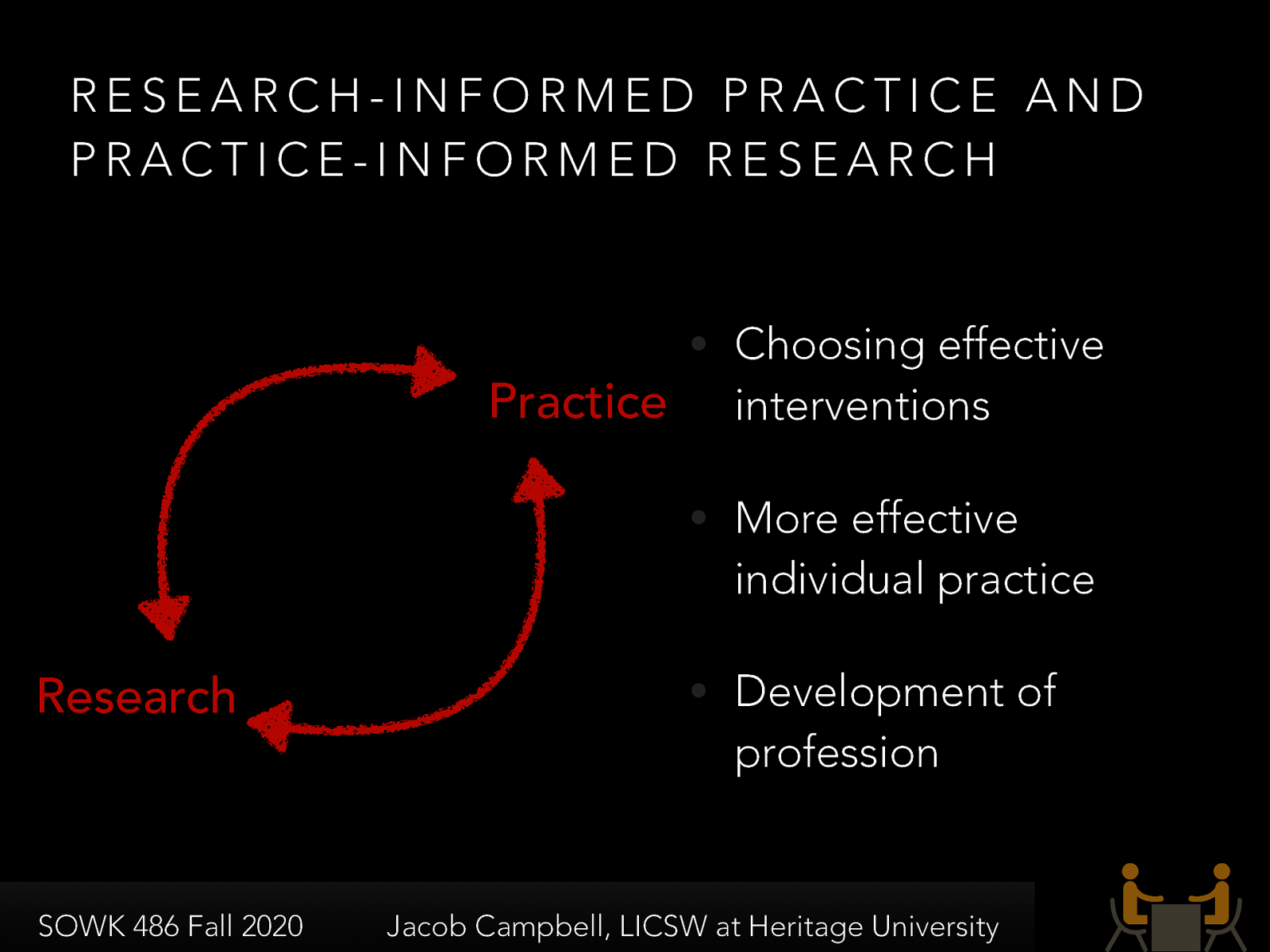
Research-Informed Practice and Practice-Informed Research
Another area of competency for social workers and part of out ecclectic base of knowledge is that of Research-Informed Practice and Practice-Informed Research
[Discussion] Why is social work research important.
Social workers must be able to evaluate effectively the work they do with clients at all levels. The evaluation of macro system effectiveness, and the ability to understand, analyze, and critically evaluate social literature and research.
Why Knowledge about social work research is important
- Scientific orientation to identify, evaluate, and choose effective interventions
- Research-informed practice is evidence-based social work
- Framing social work interventions so they can be evaluated through research thus providing information about which specific techniques work best for specific problems.
- Practice-informed research refers to scientific investigation designed to attain results related to successful social work practice.
- The second reason research is important is because with this scientific perspective, it can guide social workers to become more effective in their practice.
- The third reason is that accumulated research helps to build an effective knowledge base for the social work profession.
- This helps define social work practice, increase the effectiveness of interventions, and enhance the professions accountability.
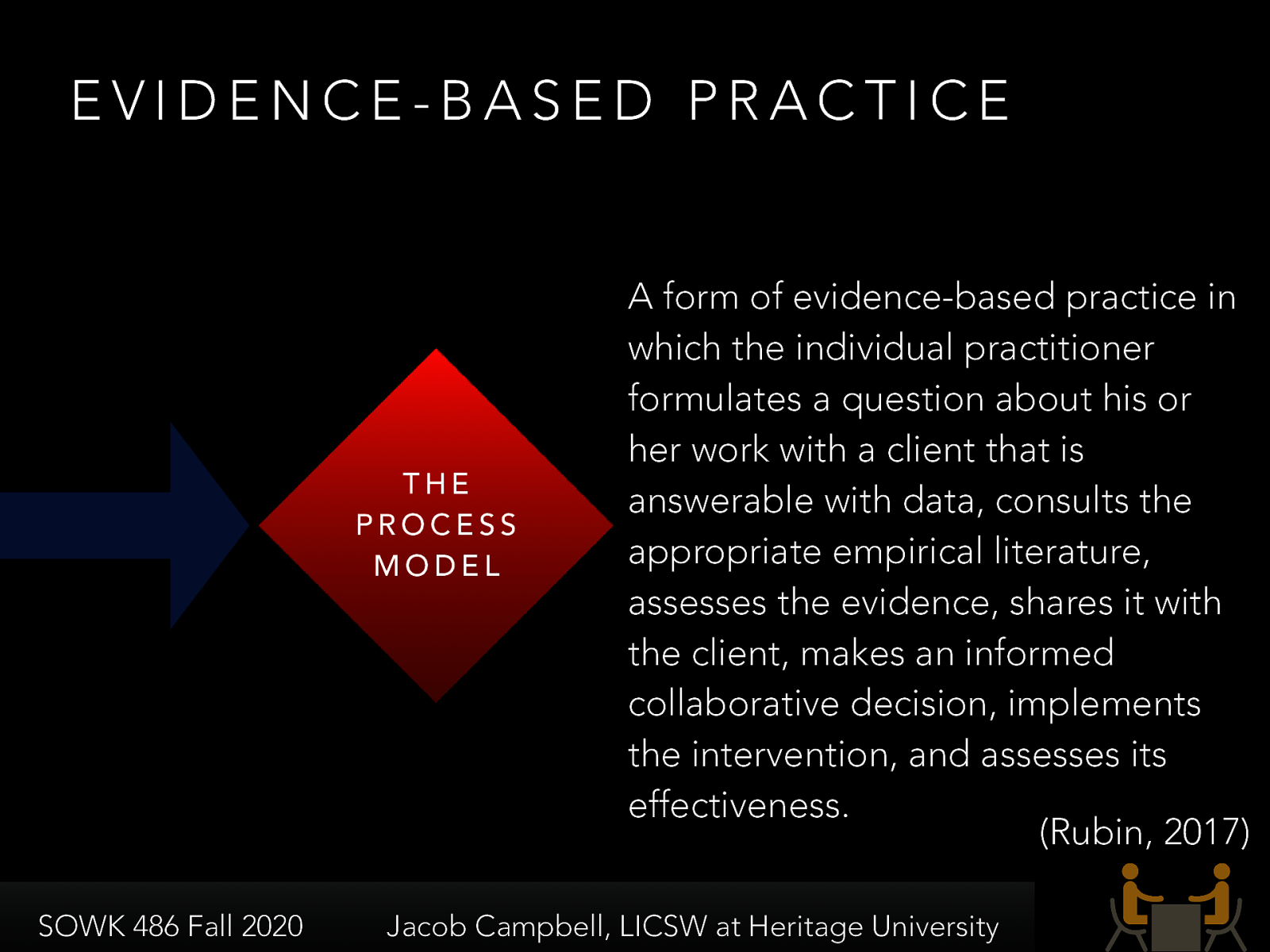
Evidence-Based Practice - The Process Model
The most standard, but also the hardest way to complete practice is through what Rubin (2007) describes as the Process Model.
“A form of evidence-based practice in which the individual practitioner formulates a question about his or her work with a client that is answerable with data, consults the appropriate empirical literature, assesses the evidence, shares it with the client, makes an informed collaborative decision, implements the intervention, and assesses its effectiveness.” (Hepworth, et al., 2017)
- Formulate question
- Shares research with client for collaborative decision
- Implements and assesses intervention
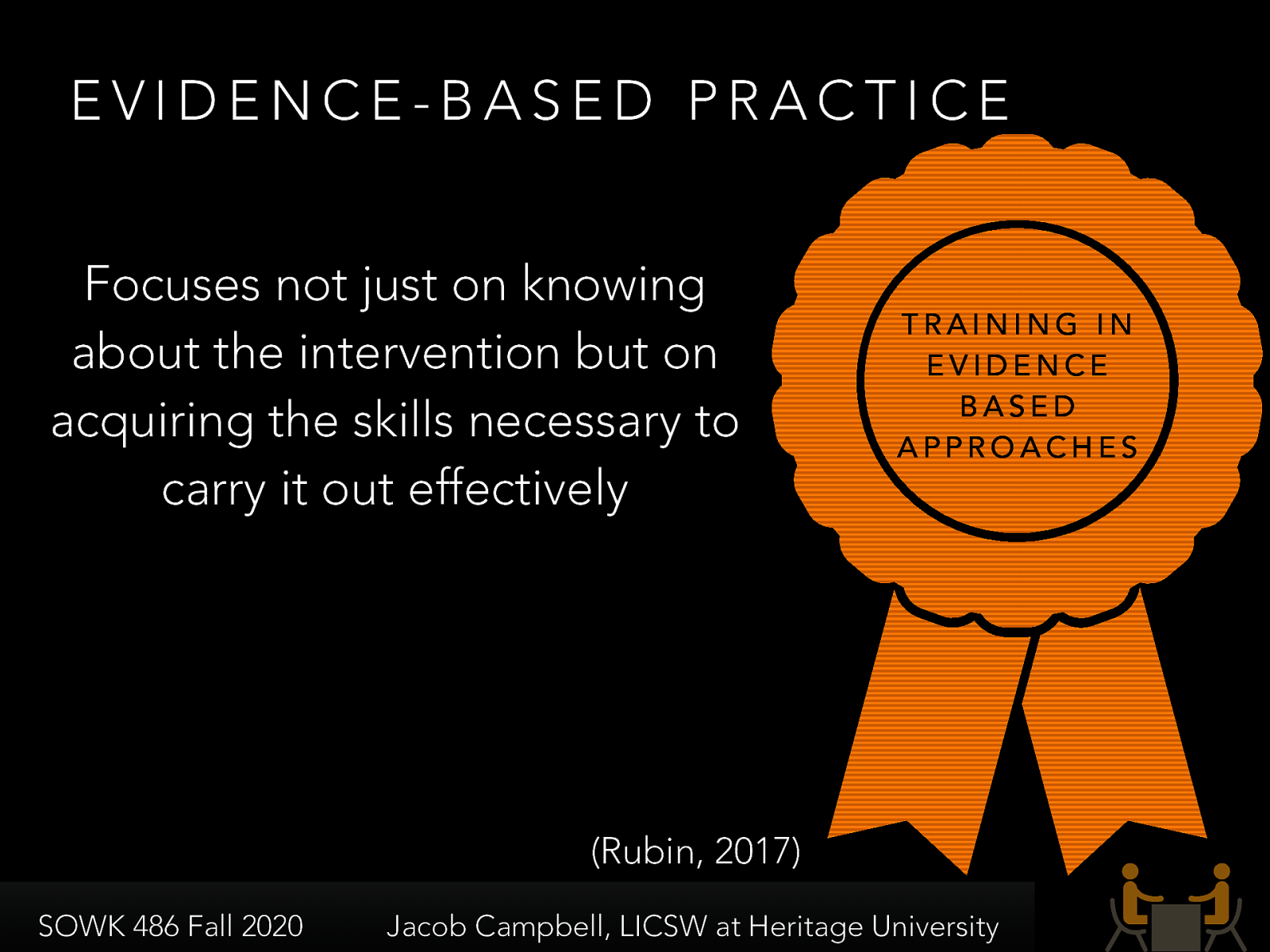
Evidence-Based Practice - Training in Evidence Based Approaches
Very common is getting specific training in a particular EBP (i.e. ART, Guiding Good Choices, etc.)
“focuses not just on knowing about the intervention but on acquiring the skills necessary to carry it out effectively” (Hepworth, et al. 2017, p. 19)
Concerns Include : Generalize beyond effectiveness, short-term nature of of EBP
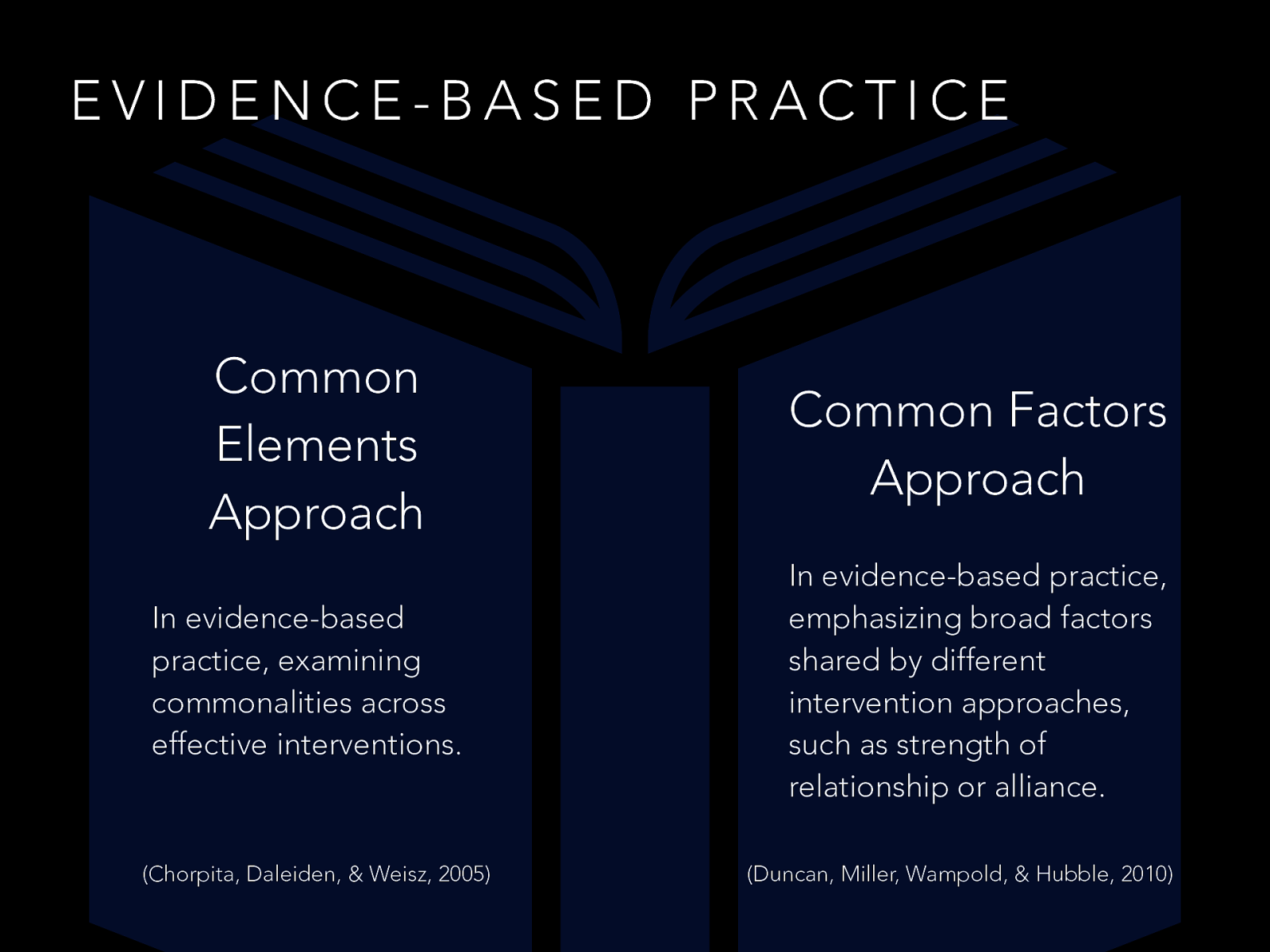
Evidence-Based Practice - Other
In working with clients, taking a more eclectic approach is sometimes the method. This is especially true with increased use of training in EBP’s…
Common Elements Approach : In evidence-based practice, examining commonalities across effective interventions (Chorpita, Daleiden, & Weisz, 2005).
Common Factors Approach : In evidence-based practice, emphasizing broad factors shared by different intervention approaches, such as strength of relationship or alliance (Duncan, Miller, Wampold, & Hubble, 2010).
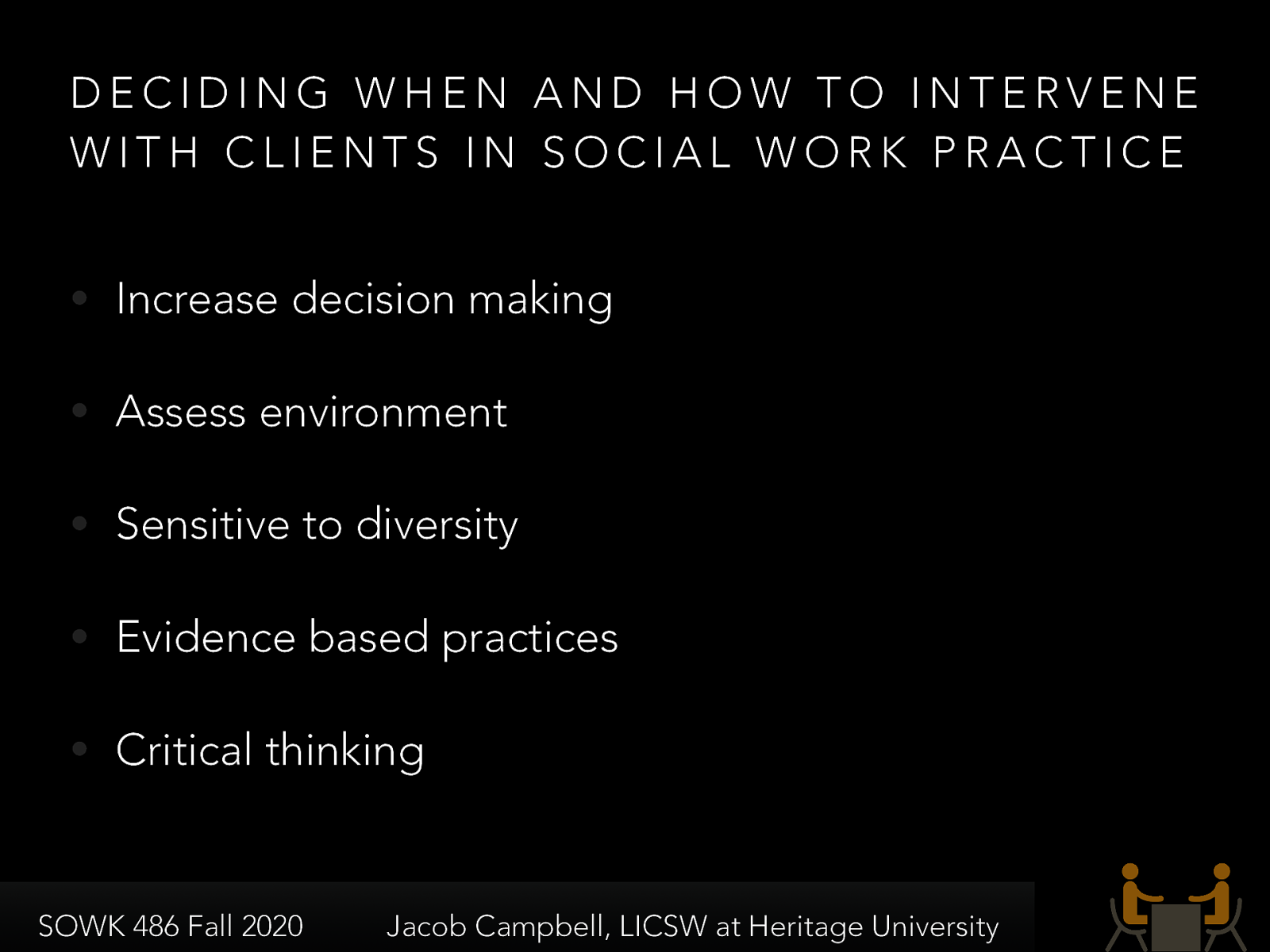
Deciding when and how to intervene with clients in social work practice
Deciding when and how to intervene with our clients is a vital skill that social workers must learn. The following are some of the criteria that we must consider:
- Increase decision making : Social workers value maximum feasible self-determination, empowerment, and enhancing of strengths to increase the client’s voice in decision making.
- Assess : Social workers assess circumstances from a systems perspective, mindful of the person in the situation, the setting, the community, and the organization.
- Sensitive to diversity : Social workers are sensitive to diversity in considering interventions.
- Evidence based practices : Social workers draw on evidence-based practices at both process and intervention levels as well as common factors in determining, together with the client, how to proceed.
- Critical thinking : Social workers think critically about practice, checking out assumptions and examining alternatives.
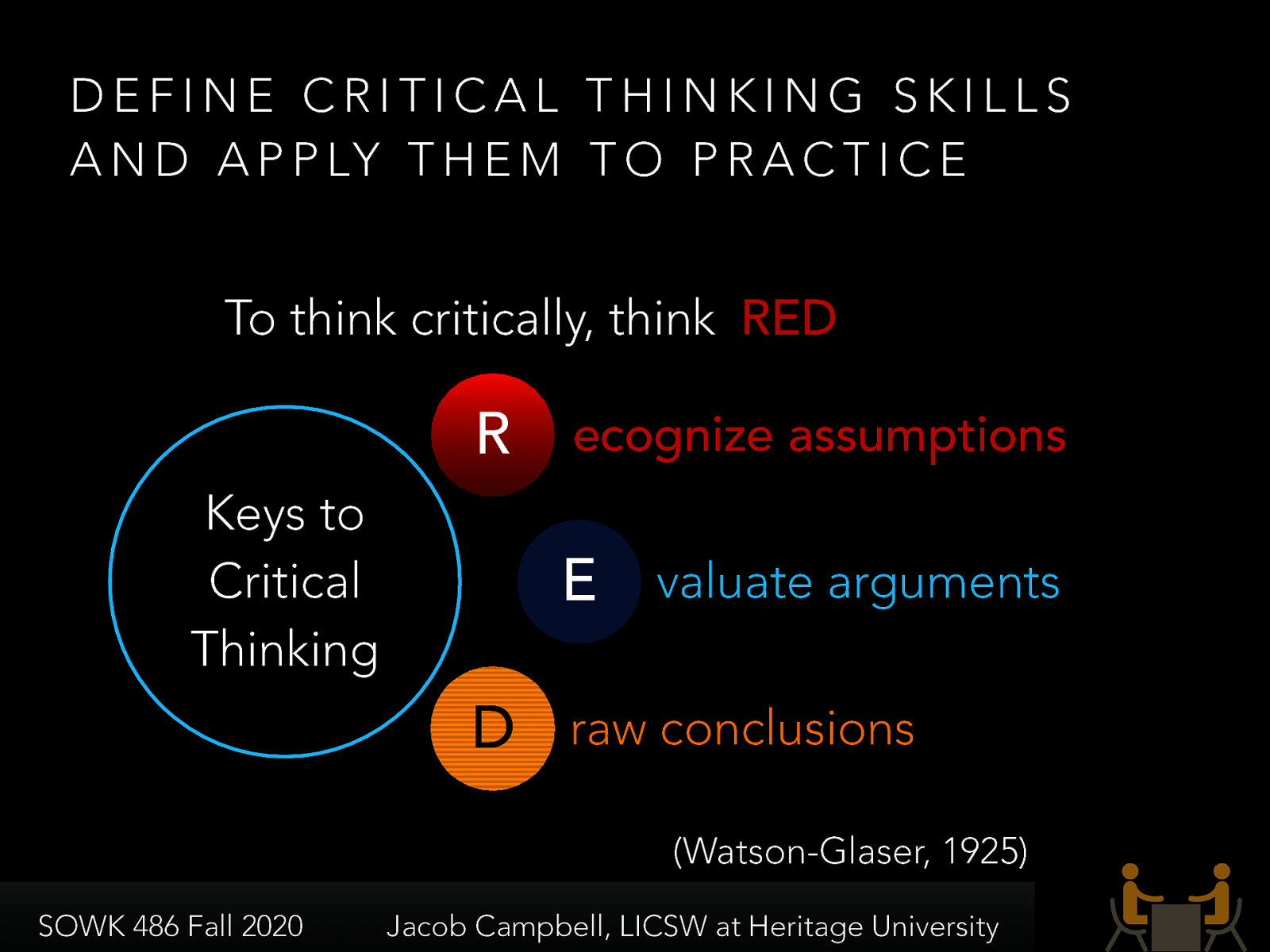
Define Critical Thinking Skills and Apply Them to Practice
(Watson-Glaser, 1925) from https://www.thinkwatson.com/the-red-model Another process for generalist practice is that of critical thinking…
The greatest thing you can learn from college is critical thinking [Discussion] What does critical thinking mean?
- Focuses on the process of reasoning.
- The goal of critical thinking is to evaluate the accuracy of impressions, assess diverse aspects of a situation, and develop creative approaches to finding solutions and making plans.
- Ask questions
- Assess the established facts and issues involved
- Its okay to question “facts”
- Careful scrutiny of what is stated as true or what appears to be true and the resulting expression of an opinion or conclusion based on the scrutiny
- Creative formulation of an opinion or conclusion when presented with a question, problem, or issue
- Assert a concluding opinion
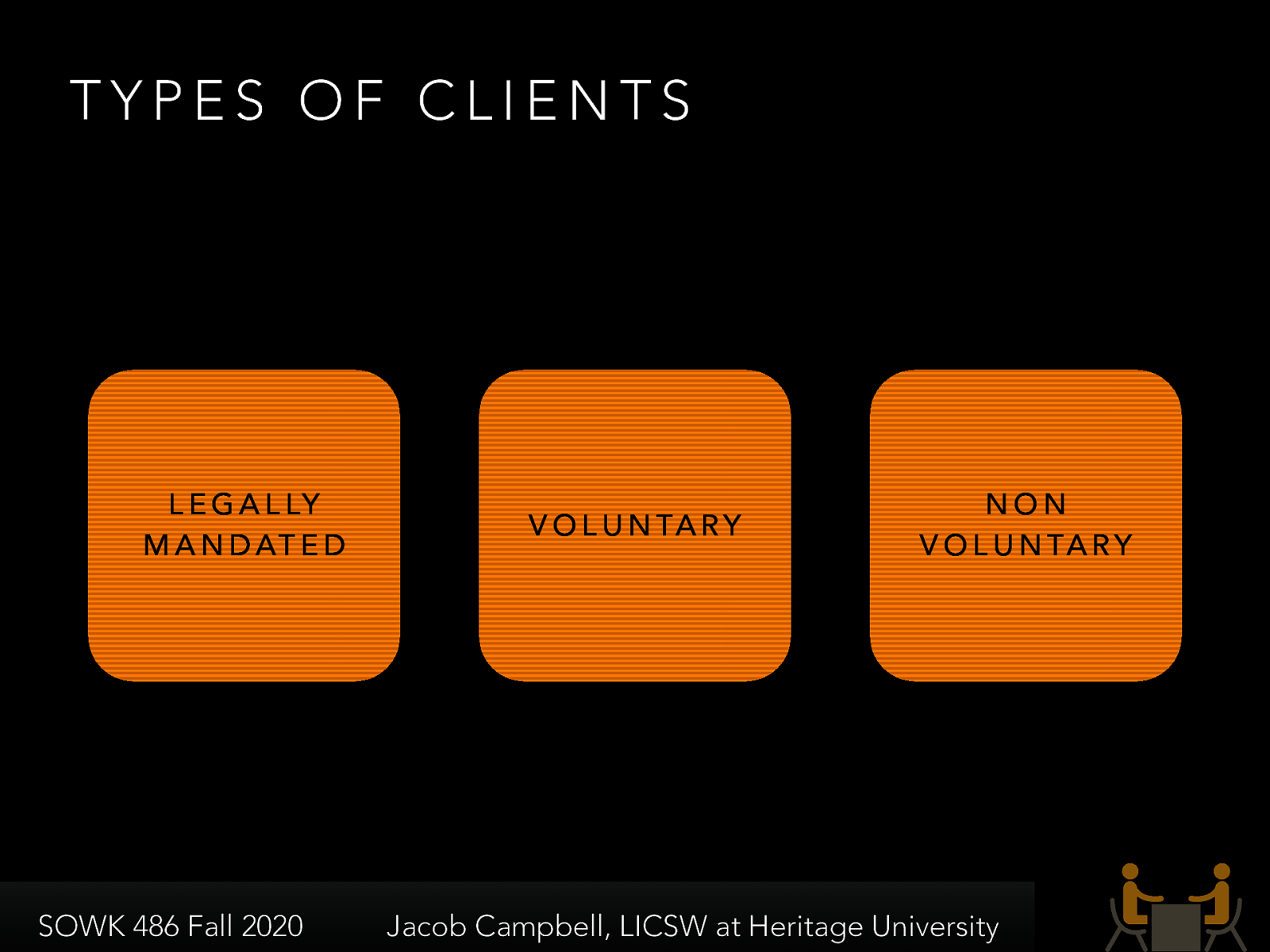
Types of Clients
In social work, we have all types of clients that we work with.
[Whole Class Activity] Discuss the differences and possible clients for each client type.
- legally mandated
- non voluntary
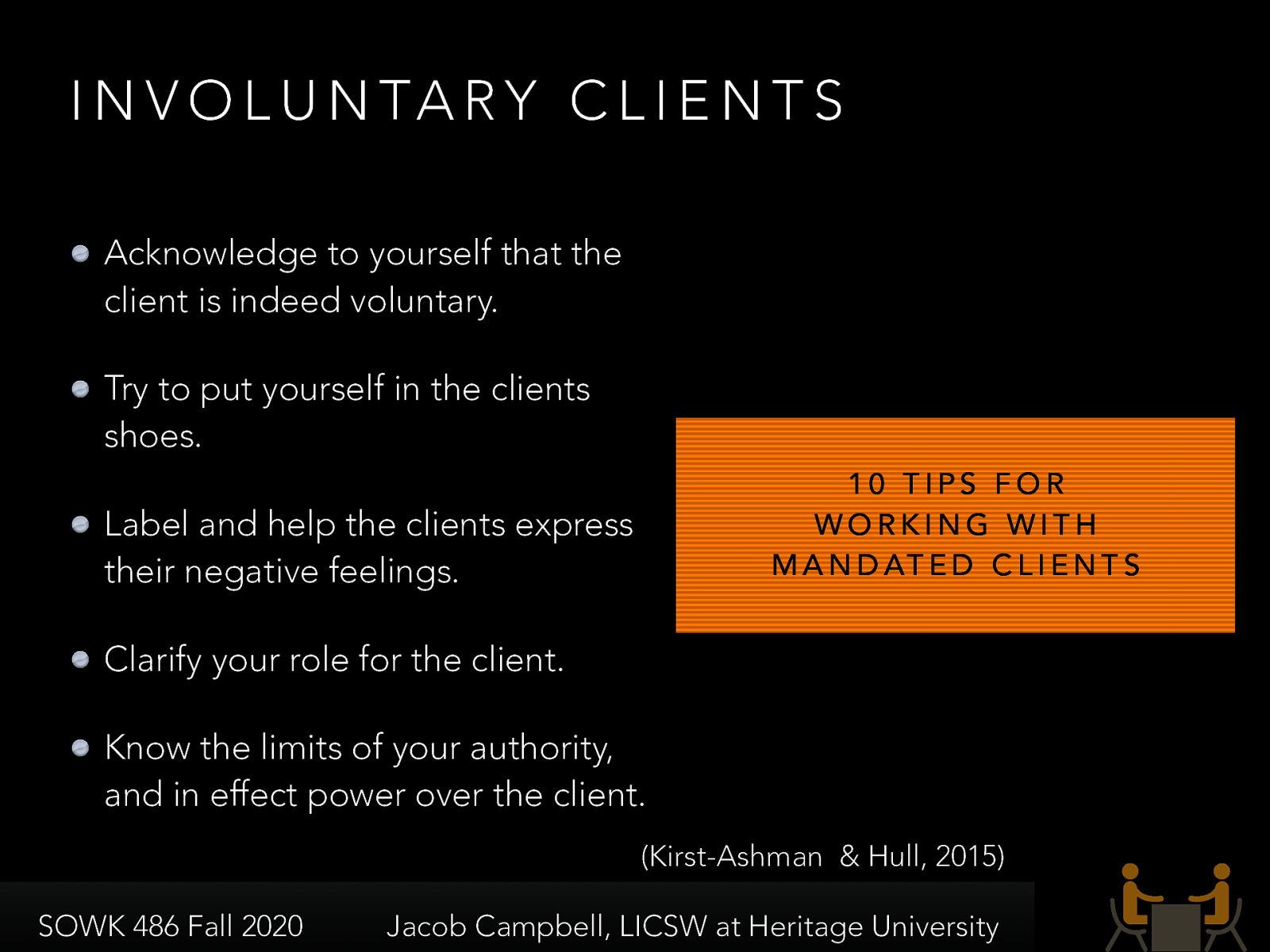
Involuntary Clients (1 of 2)
Involuntary clients are clients that are forced into involvement with social workers and really do not want to be involved. They could be mandated or non-mandated.
[Discussion] What might be some reasons for clients being mandated?
10 suggestions of working with involuntary clients.
- Acknowledge to yourself that the client is indeed voluntary.
- Try to put yourself in the clients shoes.
- Label and help the clients express their negative feelings.
- Clarify your role for the client.
- Know the limits of your authority, and in effect power over the client.

Involuntary Clients (2 of 2)
- Give them as many choices as possible including minor options.
- Figure out what you can do for the client that he or she wants.
- Use pro-social modeling and reinforcement in order to encourage and promote client pro–social values and behaviors.
- Allow the client to gain trust in you and in the intervention process.
- Accept the fact that, ultimately the client has the right to choose whether or not to cooperate with you.
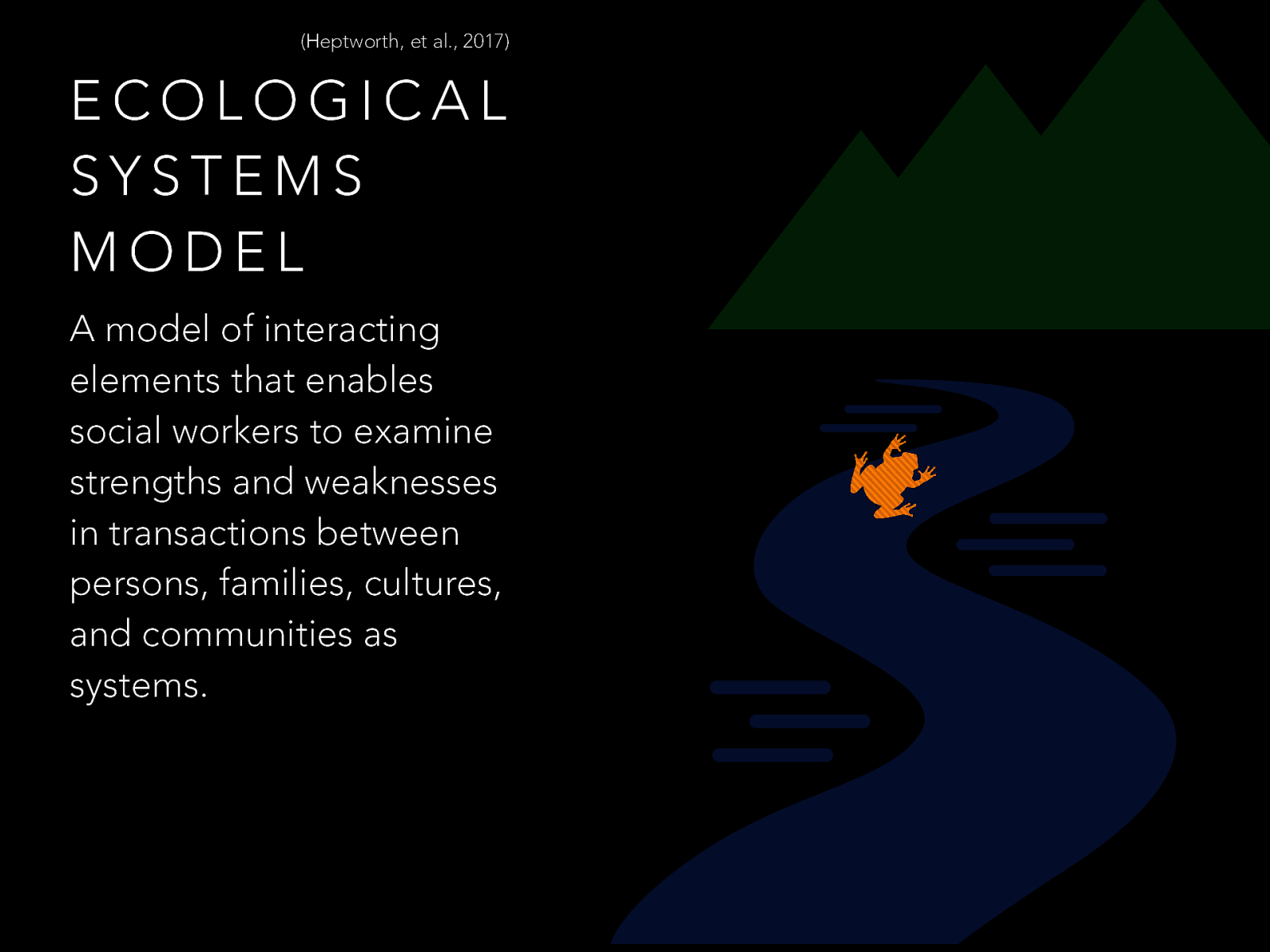
Didn’t talk about yesterday because I feel like it is a bit more difficult to understand and talk about. It’s a bit different, kind of a combination of both Ecological perspective and systems theory.
“A model of interacting elements that enables social workers to examine strengths and weaknesses in transactions between persons, families, cultures, and communities as systems” (Hepworth, et al., 2017, p. 13)
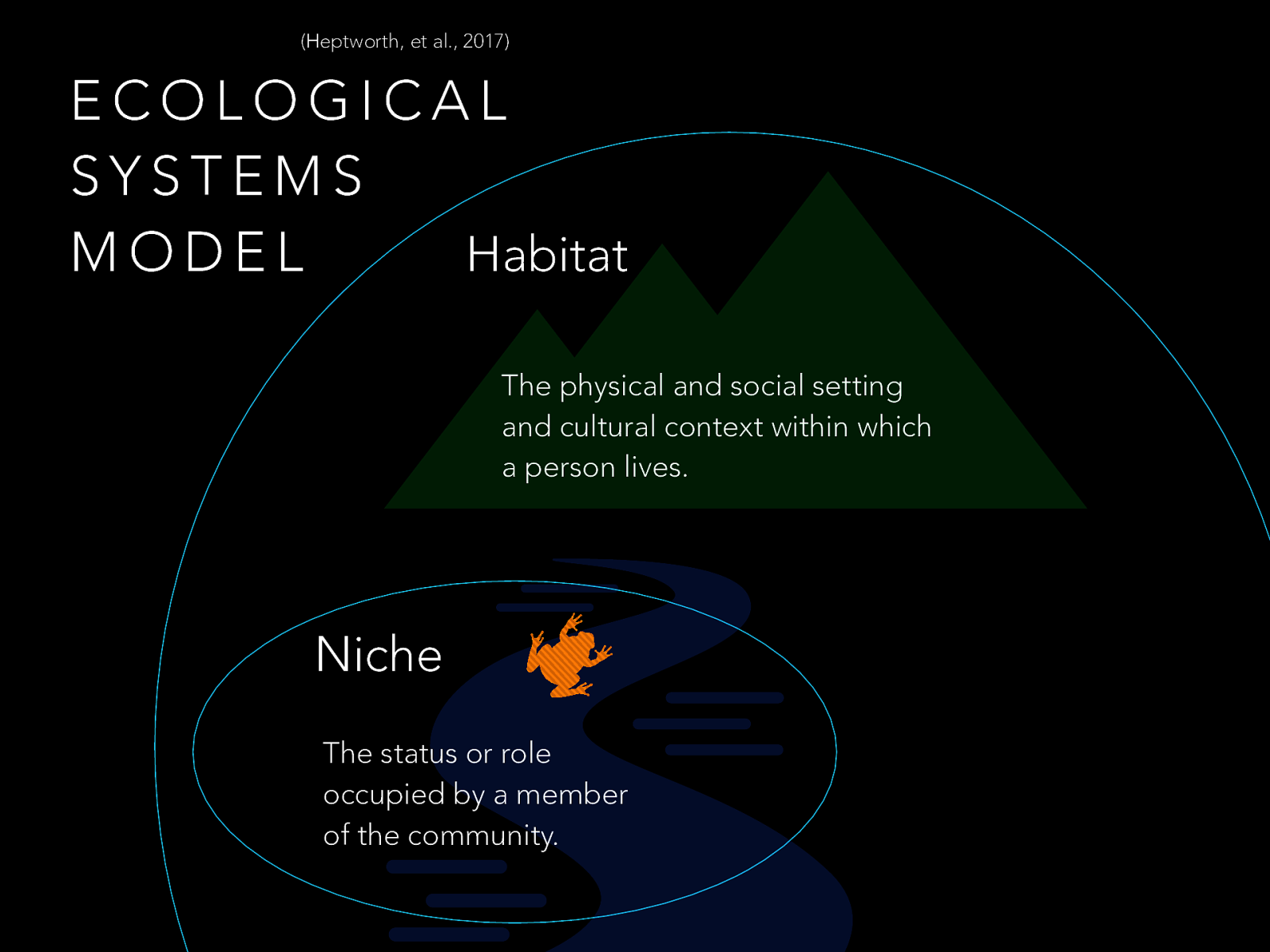
Ecological Systems Model - Habitats and Niche
Straight out of biological terms, the concepts of Habitats and niches are important in ecological systems model.
Habitat : The physical and social setting and cultural context within which a person lives. (i.e. overall environment) Niche : The status or role occupied by a member of the community. (i.e. how the person connects with the habit, think interface)
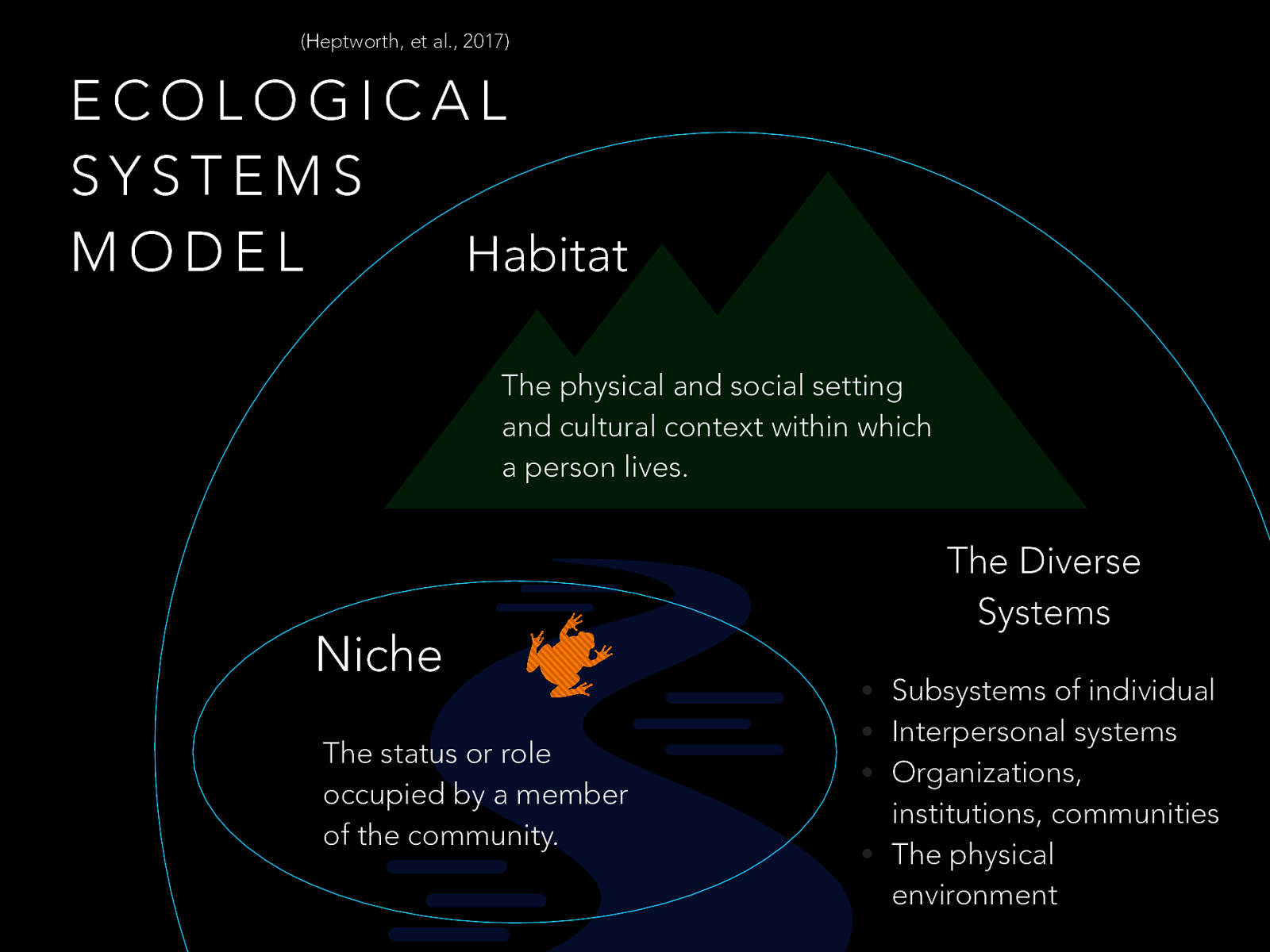
Ecological Systems Model - The Diverse Systems
“Assessment from an ecological systems perspective obviously requires knowledge of the diverse systems involved in interactions between people and their environments”
- Subsystems of individual (biophysical, cognitive, emotional, behavioral, motivational)
- Interpersonal systems (parent/child, marital, family, kin, friends, neighbors, cultural reference groups, spiritual belief systems, other members of social networks)
- Organizations, institutions, communities (housing, neighborhood environment, buildings, other artificial creations, water, weather and climate)
- The physical environment
Terms: target system action system (agency system) Closed systems vs. open systems

Ecological Systems Model - Other Terms
There are a number of terms that are also associated with ecological systems model. These include:
- Closed Systems vs Open Systems : The ability for input to change the system
- Target System : The system that has the intervention happening to it.
- Action System or the Agency system : The system that is doing the intervention
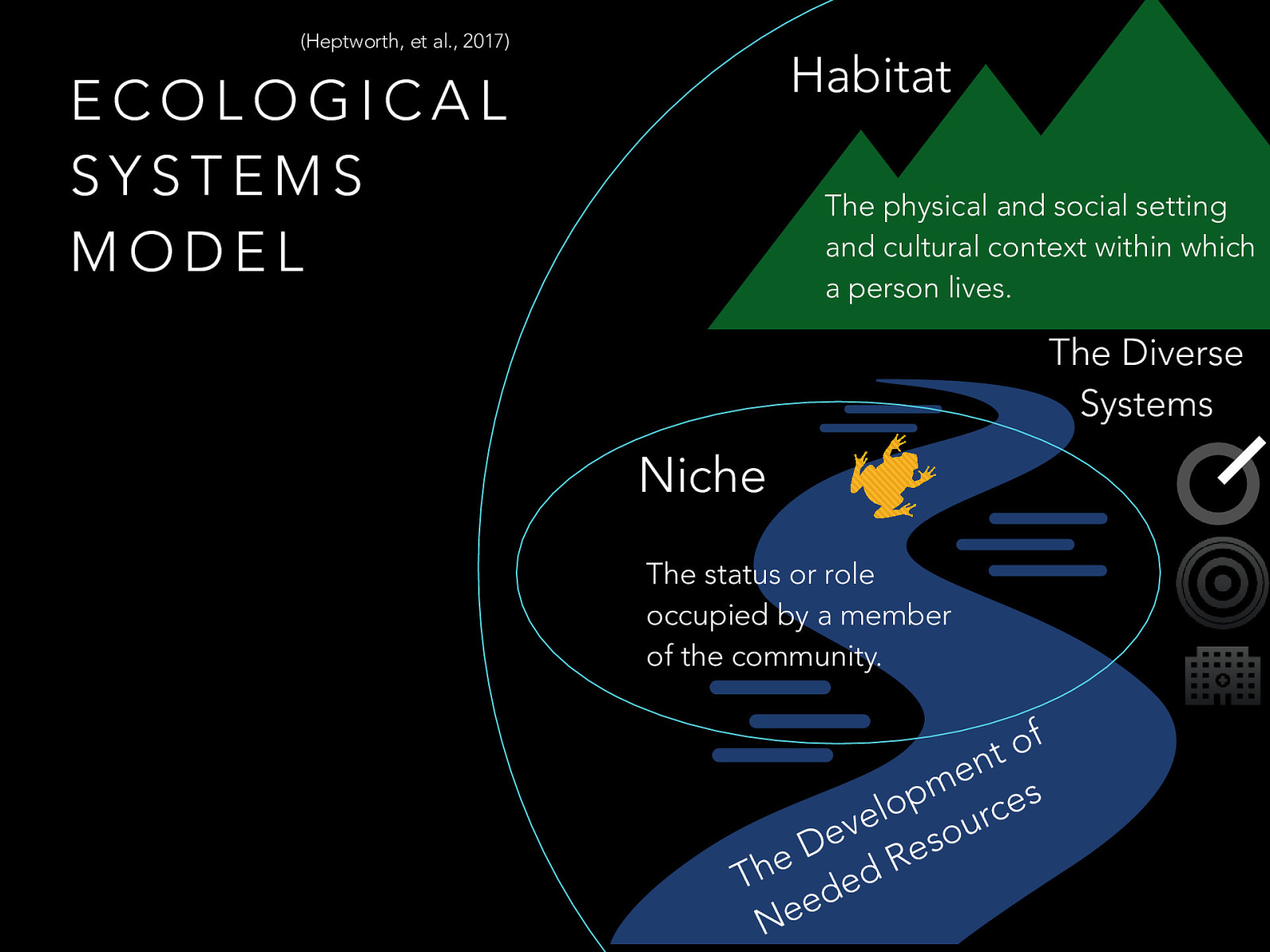
Ecological Systems Model - The Development of Needed Resources
Filling in the gaps of client needs to reach their goals. Think about / tell story of babies floating down the river.
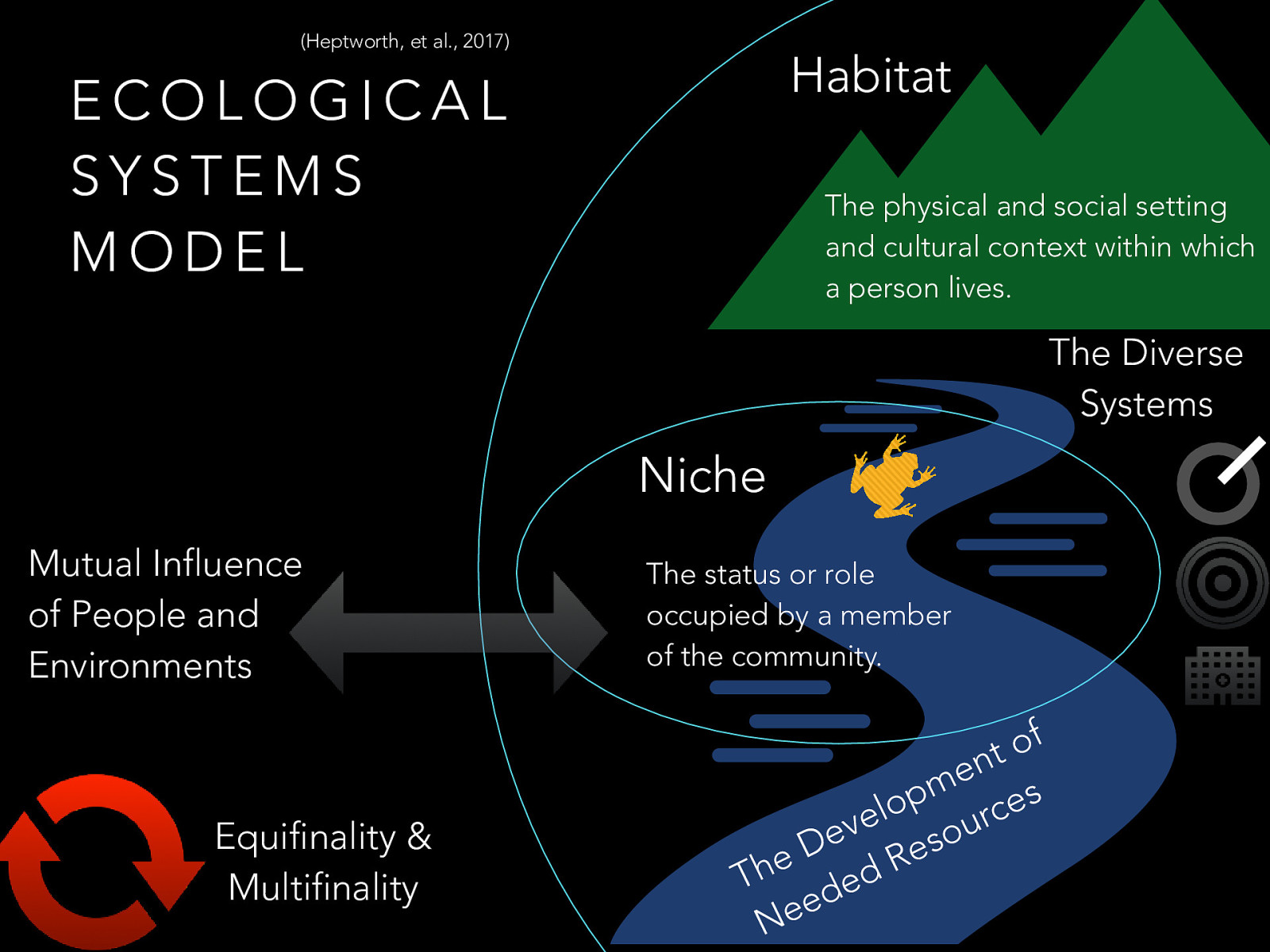
Ecological Systems Model - Mutual Influence of People and Environments
“Ecological systems theory posits that individuals constantly engage in transactions with other humans and with other systems in the environment, and that these individuals and systems reciprocally influence each other.”
Mutual Influence of People and Environments
equifinality : The principle that the same outcome can be achieved even with different starting points. multifinality : The principle that the same starting point may lead to different outcomes.

Direct Social Work Practice and Components
Social work is a extremely diverse field. One of the benefits of the generalist methods for social work is that we can practice in so many different fields of practice. While the specific job titles might not be social worker for each one of these professions, these are all areas that we practice in.
[Whole Class Activity - Discussion] discuss each of the fields of practice, with potential examples of roles social workers might take:
Most of the problems that social workers face are complex and could fall in more than one field of practice and it is important to know a wide range of services.
- Work with Immigrants
- Housing or Financial Services
- Hospital and Health Services
- Mental Health Services
- Disability Services
- Chemical and Substance Abuse Services
- Child, Youth, and Family Services
- Child Welfare
- School Social Work
- Working with Aging Clients
[Small Group Activity - Discussion] What areas of practice do you think of when you think of social work?
-> Previous other categories
- Mental health: case management, therapy
- Occupational social work
- EAP Treatment
- Organizational change
- Social services
- Rural social work-addresses needs of those living in rural areas were there is limited resources.
- Police social work-work within police, courthouse, and jail settings to provide services to crime victims.
- Forensic social work-dealing with the law, educating lawyers, and serving as expert witnesses.
- Medical social work-work in hospital settings, and clinics, discharge planning or advocating for patients.
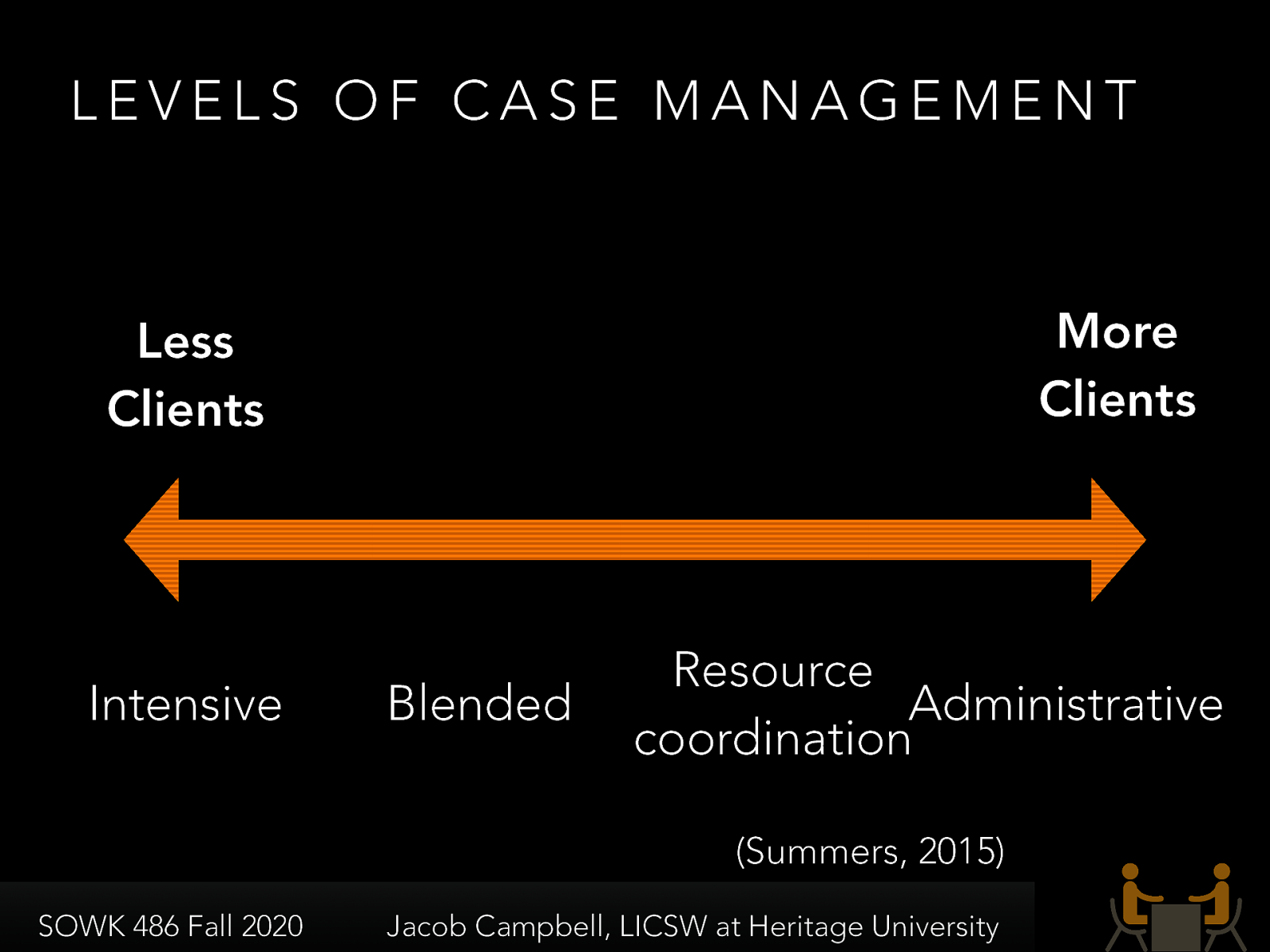
Levels of Case Management
Summers (2015) describes case management, and that different positions have different levels of case loads. These very and tend to be on a continuum.
- Limited assistance being offered
- Higher functioning patients
- Maybe example of DSHS Worker
- Higher level of care
- More in-depth planning
- Moderate level of function
- Maybe example of worker at a community mental health
- Mixture of high need clients and lower need clients
- Variable level of functioning
- High level of care necessary
- Going with clients
- Low level of functioning
- Maybe example of wraparound, PAC Team… etc
Summers, N. (2015) The fundamentals of case management practice: Skills for the human services . Cengage Learning: Boston MA.
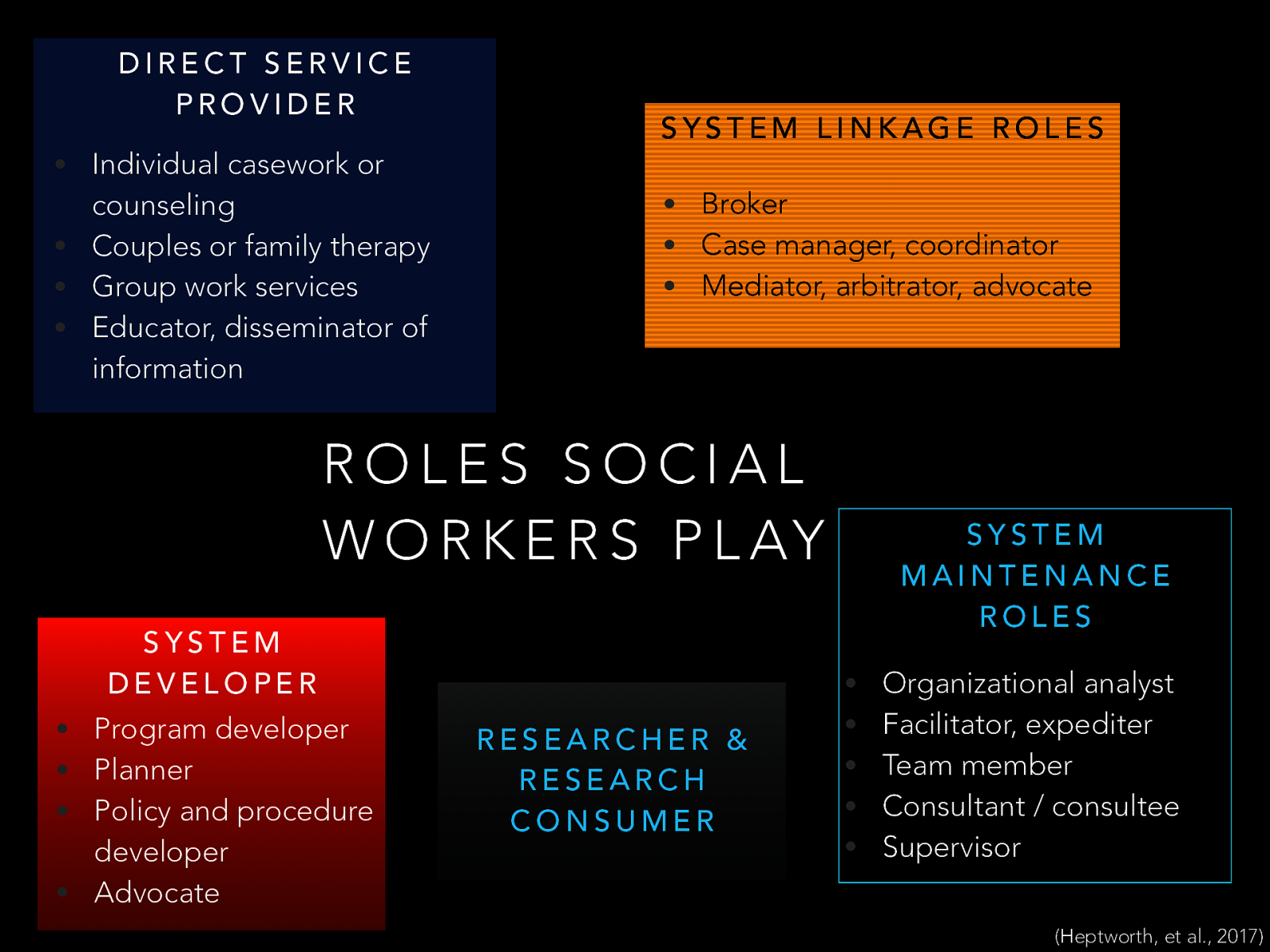
Roles Social Workers Play
Along with the various areas of practice that we fulfill, we also have roles that we implement. These include the following:
- Individual casework or counseling
- Couples or family therapy
- Group work services
- Educator, disseminator of information
- Case manager, coordinator
- Mediator, arbitrator, advocate
- Program developer
- Policy and procedure developer
- Researcher & Research Consumer
- Organizational analyst (worker who pinpoints factors in agency structure, policy, and procedures that have a negative impact on service delivery)
- Facilitator, expediter
- Team member
- Consultant / consultee

IMAGES
VIDEO
COMMENTS
Research Proposal: Part 1 London Jolivette Master of Social Work, Walden University SOCW 6301: Social Work Practice Research 1 Dr. Tiffany Wells October 30, 2022 fResearch Proposal: Part 1 Introduction Homelessness is a significant issue in today's societ. SOCW 6301.
Integrative Assignment II. Christiane M. Buniel Rutgers University Social Work Practice 1 19:910: Professor Lisa Eible, DSW, MSW, LCSW December 14, 2020. Abstract The integrative assignment will showcase the case's theories and reflection made concerning the field placement, and the client's information. The involvement made by the client and social work intern will be discussed and analyzed.
Introduction. For this assignment you will need to: identify a list of 10 peer-reviewed social work journals from the library that you might find helpful relative to your social work practice interests. discuss why using research studies from peer reviewed journals is important to the development of knowledge in social work.
A WRITING GUIDE FOR SOCIAL WORK 3 Introduction Social work is a writing-intensive discipline. Whether we work with individual clients in direct practice, work with administrators in community organizing, or conduct social-work research, we will write, revise, and proofread for the rest of our professional lives.
Instructions: Review lecture notes from Week 1 and all required readings for Week 1 and Week 2. Read the attached case study. Given what you have learned during our first class session and the Week 1 and 2 readings in a 4-5 page double-spaced (12 pt. font; 1" margins) written report, use the following headings to concisely answer these questions:
The Social Work Assignments Handbook is the complete guide to preparing for, carrying out and writing up a social work assignment or project. Designed to support students through their assignments from beginning to end, each stage is fully explained through friendly advice and practical guidance so that students can feel confident in their work, whether they're writing up quantitative ...
The first day, week, month, even semester of school can bring a variety of emotions. I hope these tips, tricks, and information on social work can help you to feel more relaxed about beginning your journey. Planning Your Schedule. This is the fun part! You are taking the first steps towards your next chapter in life and these are the first ...
Assignments. Component #3 Client engagement and bio-psycho-social assessment. This is the first of a two-part assignment. You will need to choose one of the posted short stories for these two assignments. Using the character in the story, you will submit a paper addressing the following:
This short book covers the series of steps I took to move from failure to first. I hope it helps you on your own journey in social work too. In this short book, the first 3 focuses cover what happens before your coursework has been assigned. It covers the basics of class-going, reading, and creating the right study environment.
Alexander SOCW 501 1. SOCW 501 - Practice I: Social Work with Individuals. Texas A&M University-Texarkana Course Syllabus. Fall 2020. Instructor: Bree Alexander, Ph.D., LISW-CP. Email: [email protected] (Please reference SOCW 501 in the subject line) Office: SCIT 318J. Office Hours:
1. By Micah Beckman, MSW. This chapter was written by Micah Beckman, a social work MSW student, as her final Capstone project. The purpose of this chapter is to provide introductory knowledge regarding the history surrounding the social work profession and orient students to the professional roles and knowledge required to become an effective ...
Description. The Social Work Assignments Handbook is the complete guide to preparing for, carrying out and writing up a social work assignment or project. Designed to support students through their assignments from beginning to end, each stage is fully explained through friendly advice and practical guidance so that students can feel confident ...
75 minutes per week Office Hours: By appointment via Zoom INTRODUCTION TO SOCIAL WORK & SOCIAL WELFARE I. STANDARDIZED COURSE DESCRIPTION This is an introductory social work course in which students will learn about the profession of social work and its history: it's areas of practice, values, and ethics. The history of social welfare
Week 6 Writing Coherent Social Work Assessments Weisman & Zornado: Chapter 2; Week 7 - Week 9 Writing Effective Case Histories and Supplemental ... Chapters (Topics) Assignments EP 2.1.2 Apply social work ethical principles to guide professional practice. a) recognize and manage personal values in a way that allows professional
Integrative Assignment I. Christiane M. Buniel Rutgers University Social Work Practice 1 19:910: Professor Liesa Eible, DSW, MSW, LCSW November 25, 2020. Abstract The integrative assignment will showcase the engagement made concerning the field placement, and the client's information is disclosed. The classification of involvement made by the client and social work intern will be discussed.
reading journal week 1 social work 1710 journal entry week module submitted to: sulemana fuseini submitted : katelyn galway (201734423) date of submission: Skip to document. University; High School. Books; ... Geography 1050 Assignment 1. Geographies of Global Chang 100% (6) 6. Geography 1050 Assignment 2. Geographies of Global Chang 100% (4) 4.
1 Mar 2022 by Jeremy Sutton, Ph.D. Scientifically reviewed by Jo Nash, Ph.D. Undoubtedly, the role of the social worker is a challenging one. This may be because of its unlikely position, balanced between "the individual and society, the powerful and the excluded" (Davies, 2013, p. 3). Social ...
I began my first week as a social work intern with a home health care agency with high hopes. I hoped to cure the sick, provide for the elderly, and make many, many grateful friends along the path of this sunny, happy job. I realized within hours of my arrival that needs within my sheltered, safe little community were much greater than I had ...
ASSIGNMENT Week 1 Assignment Micro Social Work Practice January 16, 2022 Capella. AI Homework Help. Expert Help. Study Resources. Log in Join. Micro Social Work Practice- Week 1 Assignment.docx -... Doc Preview. Pages 2. Total views 17. Capella University. SWK. SWK 5004. lj0723. 8/1/2022. View full document. Students also studied. Chapter 3 & 4 ...
The seminar will address issues related to the Essential Attributes and Abilities and is designed to support students in achieving the defined learning objectives for the first year and to deepen their understanding and integration of content from the summer course work. Students are expected to use the seminar as a forum to discuss their own ...
The NASW Code of Ethics is a set of standards that guide the professional conduct of social workers. The 2021 update includes language that addresses the importance of professional self-care. Moreover, revisions to Cultural Competence standard provide more explicit guidance to social workers. All social workers should review the new text and ...
While the community analysis assignment required the student to interview six of her neighbors, the resulting increase in social capital in the neighborhood led, over the next two years, to the student being elected President of the HOA and organizing the community to win streetlights, clean up a polluted retention pond, create positive ...
SOCW 6101 Essentials Skills Week 8 Assignment Practicing your social work skills through a role-play scenario is an essential part of a social work education. This is an opportunity to learn before interacting with vulnerable clients and unintentionally causing harm. Role-play assists you in identifying the areas where you are strong, as well ...
Location: Online - Zoom. Time: Monday's from 5:30-8:15. Week 04: 09/14/20. Topic and Content Area: Direct Social Work Practice. Reading Assignment: Hepworth et al. (2017) chapters one and two. Assignments Due: A-02: Asynchronous Class Engagement the NASW Code of Ethics and Me discussion forum with an initial post due Friday 09/18/20 at 11 ...